#are trying to piece together things like not just a sequence of events but the resultant narrative. ''solving'' the identity & Role of
Explore tagged Tumblr posts
Text
you always knew marble hornets is good b/c fr from 2010 on the Many fans &/or the particularly Enthused &/or Dedicated &/or Lasting fans was noticeably to us all like hmm tending to be many people who are big fans of aLex Guy from the tunnel rip Brian Tim Questions Investigations Answers....i presume it still skews that way. i.e. Tastehavers i.e. Marble Hornets Is Good b/c it can resonate with queer experiences unlike horror that straight people are like "Hell Yeah truly this is good" about, which is a waste of everything
#sort of half pondered / rhetorically questioned / some theories floated at the time like hm why Is this a bunch of gays transgenders etc....#but also just correctly taken as a stamp of quality and nobody is exactly pressed about it#marble hornets#certainly nothing particularly heterosexual is going on or even has too much of a medium & space to go on#certainly there is Not any particular backdrop of ''''normalcy'''' whether via We Are All So Straight or anything else#certainly there Is a lot of ''so this guy is looking for or thinking about or trying to successfully connect with in 1 way or another#Another Guy'' but of course like the queer experiences / context Resonance isn't just ''could these Same Genders kiss or whatever''#in this & in all things always fr....#again that first of all there is never a backdrop / context / assumption of Normal World Normal Guy Normal Life#what there Is regarding that is pretty distant & bare bones. glimpses of ''yeah no matter what That's an interruption of your life''#like i said that like the way things are presented kind of everyone always is figuratively wandering alone in a wintery forest#there's a lot of not just solitude but Isolation / alienation / disconnect. that there's a continuous Mystery where also our protagonist/s#are trying to piece together things like not just a sequence of events but the resultant narrative. ''solving'' the identity & Role of#other parties here & also their own. us as the audience invited to do that too b/c it's always unreliable narrators / protagonists & b/c#[it's not really an arg!! it's not really an arg!!] but ofc b/c we're Meant to have room to be Analyzing & Theorizing & discovering info#b/c markedly the [so: what's going on. what is that literally? what is it figuratively? as a theme?] is even more open ended for us with#people pointing out the resulting flexibility. it can be pretty much whatever. there's kind of rules but what if not really? what if: and#what can you do about it anyways? and: and what works best is people finding the rare & isolated person who already knows firsthand what#is going on &/or will go ''hmm yeah idk that resonates'' if you try to discreetly venture to see if so. but even then you're just a few or#just two people & at any time you could be endangered / attacked just kind of because. we could go well beyond 30 tags but like ofc as#also in all things it won't be Thee entire consummate queer experience b/c that doesn't exist & also it doesn't all have to fit perfectly#into a metaphor when [what does even if one was deliberate? & it wasn't deliberate here like & this will all represent lgtbq times]#but anyway one can see how ''well something's sure going on here. kind of increasingly encompassingly / intensely''....a classic#like tim's right also as in calling all marble hornets enjoyers skinamarink is a good time. do i think it's meant to be about [everyone &#their mom (lol) who points at it & goes That's A Tuesday. Yeah regarding growing up in a household as an abused/neglected child] Prob Not#yet (a) lotta room for interpretation (b) word of god knowledge being (i) invoking a Child's Perspective (& physical pov even) b/c of in#fact trying to evoke / being inspired by the like abstraction of childhood nightmares & (ii) saying it's basically hansel & gretel okay so#we have a the witch(tm) but who also in said story may be implicitly an antagonistic / mistreating human ''false'' parent anyway....#interesting! (that is to say it's easy to suppose combining these elements = thee mundane horrors well represented for once in our lives)#& alternate ''theories'' seem p literal the Coma Dream the Hell Fr like ok both have any basis but cmon. how to beat the skinamarink.mp4
1 note
·
View note
Text
Hey Look At This Comic: Chainsaw Man and Don't Get Around Much Anymore




this title is so funny. hey you probably haven't heard of this small indie comic, yeah it's pretty obscure it's called Chainsaw Man.
here's an even funnier joke: hey have you heard of this comics guy, name of Art Spiegelman?
before Spiegelman wrote that book you probably know him better for (ha ha he he) he did a lot of other comix, particularly a lot of one page experiments. one in particular stuck with me: Don't Get Around Much Anymore, a simple exploration of a narrator's apartment. there's a lot things Spiegelman does to enhance the sense of stasis, isolation, and depressive gloom in this comic, and the New Yorker a while back published a great summary by Spiegelman of his own techniques. what stuck with me the most was the sense of time out of joint created by his manipulation of narrating text and panel contents. throughout the comic, the text and images are "out of synch [sic]". for many panels, the text describes the image we've just seen rather than being illustrated by the panel it's in. there's even a weird pivot in the middle where we briefly look ahead before getting caught again in the backward flow.
because of the kind of person I am, I flashed back to this comic after reading Chainsaw Man issue 172. in it there's a bunch of moments where speech bubbles and panels also seem to be out of sync. so, I dug DGAMA out again and took a look. actually, I did more than reread it: I followed its soundtrack instructions, "to be read to the accompaniment of a dripping faucet, slowly." I'm trying to do more dumb bullshit that artists tell me to do these days because A. it's not like they're going to squirt me with their rubber flower or get me with the ol' ink around the telescope trick, come on and B. we do all kinds of arbitrary, annoying tasks in order to access an intended artistic experience: we call it "video games".
so I went in the bathroom with my girlfriend's copy of Metamaus, found the page where they reproduce DGAMA, and adjusted the faucet. how slowly to drip? well, if it's too low "slowly" becomes "inaudibly" so nudge it up a bit more. ok, tap... tap... couldn't hear that one... tap... good enough. and I read, and when I got to the panel where the narrator's description lines up with the panel contents, "all the water I can use pours out of the faucet with a flick of the wrist," the faucet made the loudest little "plop" yet. damn. A+ Art.
the reading experience is something like this: where a comic might often get chewed up fast, eyes rushing across the page, this one encourages a kind of juddering, halting back and forth between panels. it's almost got a hypnotic quality, paired with the dripping tap. it's such a simple page, but I found myself weaving back and forth over it many times in order to make sense of all the relations. the schematic representations at the top of the page take on an almost mocking quality--you can piece together the floor plan and how everything fits together, but doing so just pulls you into the comic deeper.
the effect of disjointed time in Chainsaw Man isn't the same, but there's some parallels. I find that I have to reread Tatsuki Fujimoto's action sequences a lot of the time to figure out just what is happening in them. this could be seen as a flaw but I think creates a deliberate sense of chaos. whatever occurs in Chainsaw Man can be understood, but only after the fact. in the moment events just occur, then we are invited to dissect the aftermath like crime scene investigators.
for that kind of effect, the disorienting pairing of seemingly out of sync words and drawings works perfectly. Fujimoto likes action sequences that don't linger on the tweens, jumping instead from impact to impact to impact. (this contrasts his dialogue scenes which often incorporate pauses and repeated static panels.) in the page here, a devil whose deal I can't be bothered to remember says "I dodged it!" only to realize that their head's been cut off. only, that's not really right, is it? the speech bubble is "I dodged it!" but in the panel the killing blow has already been struck. the speech bubble, as in Spiegelman's comic, seems to be lagging a bit behind the action. look at the two page splash too: if we're inclined to read the action the same way we read the rest of the comic, right to left, we arrive on the right hand of the page, where the action has already completed. we don't follow Chainsaw Man's trajectory but instead focus on where he already is, reconstructing the violence as we pass back across the rest of the page. to me, the skipping of intermediate moments, the page compositions, and this disunity between text and image, invites something similar to the passing back and forth over panels that we see in DGAMA.
is it that deep? if you think about this I suppose you can conclude "this is the character dying before they know it" which, sure, though I think that raises some interesting questions like "how do you get a whole sentence out with a severed windpipe and vocal cords". there's a moment later on when some dude is like "you guys! get behind me!" as, again, the panel shows his head and arms flying off. I guess there's a pretty established convention in manga and anime at this point of allowing gravity to be as weak as it needs, in order to let someone say as much as they want while their limbs are flying off, not unlike opera's convention of having someone get stabbed and then stand up to sing an aria with the sword still sticking out of their lungs.
nevertheless, I think it feels experientially distinct when you have a static image, ostensibly representing a unit of time, and the panel contents are this transparently incompatible. a more interesting way of looking at it is: death comes so fast for these characters that the comic can't keep up. it's not the speech but the speech bubbles that are out of joint here, the action leaving its medium behind. it's a radically different end effect than the one Spiegelman aims for, and is a lot less ready for the cover of The New Yorker, but the underlying principle of decoupling word and image in order to create a sense of time not quite functioning correctly remains the same.
if you wanted to achieve this in film, what could you do? maybe desync the audio track? it's an interesting possibility, though one I think a lot of viewers would experience as a transcoding error rather than an intended effect. or you could do something like the astonishing sequence in the most recent episode of The Elusive Samurai where, like Chainsaw Man, intermediate actions are removed so that a character is abruptly standing next to a bunch of headless corpses blooming blood flowers in slow motion. there's ways to capture something of the energy of Fujimoto's work.
...I don't think the anime adaptation of Chainsaw Man really tries, for the most part. both the slow awkwardness of conversations with their static compositions, and the way the action tends to skip clear movement for noise and destructive aftermath, aren't really suited to the style of high budget blockbuster anime, which wants to pack the screen with little movements, as though to make sure the money is visible with each frame, all the ones accounted for. the adaptation has largely opted to look as good as possible all the time, for a given value of good, in a way that I think loses a lot of the grungy charm of the comic.
even the most suited adaptation, though, would still lack one of the fundamental qualities of the comic page: its altogetherness, its arthrology as Thierry Groensteen terms it, its nature as a bunch of panels in a metaframe, taken in at a glance, or pages easily flipped back and forth across. it's this that allows us to pass back and forth over the page like we're reconstructing the calamity from the evidence after the fact.
this post originally ran on Cohost on August 19, 2024. you can read more reviews in the Hey Look At This Comic tag and support me on Patreon.
#Hey Look At This Comic#comics#Chainsaw man#manga#comix#art spiegelman#tatsuki fujimoto#comic review#comic recommendations
358 notes
·
View notes
Text
The Draw of the Hetalia Fandom (and Why You Can Never Leave)
From the perspective of a fan of (technically) twelve years or so.
Something occurred to me a while back, and I wanted to share it to get other people's thoughts. I'll try to add funny pictures and gifs to break up the wall of text so it won't be as exhausting to read.
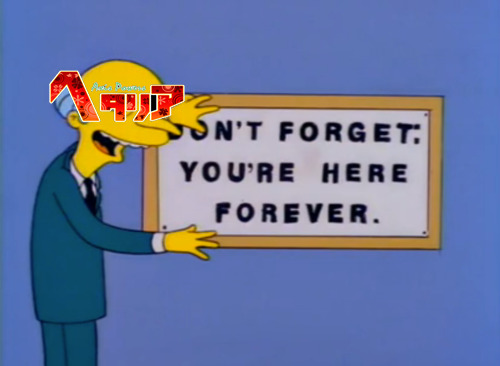
I made a post the other day about how the Hetalia fandom always draws you back in. This was, of course, based on the joke about how you can never really leave the Hetalia fandom. A joke you can find virtually everywhere you look in fan spaces online.
But this begs the question. Why? Why can't you ever truly leave the Hetalia fandom? What is it about this fandom that consistently draws you back in?
And note that people don't talk about Hetalia itself, but rather its fandom. You could stop watching the show or reading the comics for years, but the fandom is what won't fully leave you be.
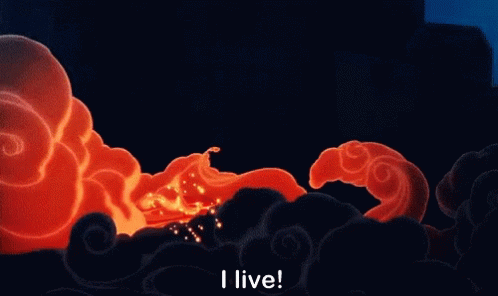
(The Hetalia fandom every time you check to see if it's dead yet).
One answer I've heard has to do with the phenomenon known as Associative Memory, where you can learn and remember the relationship between unrelated items.
For example, you watch Hetalia, a series about the countries of the world personified as anime characters. These characters have their own personalities, traits, quirks, etc. And the more you watch the show and get into the fandom, the more you start to associate these things with one another.
For instance, someone can say the word Italy, and I'll start thinking about Feliciano Vargas. Or someone could say the name Matthew Williams, and I automatically associate that with Canada. Or I could see bushy eyebrows and immediately start thinking of APH England. Heck, someone starts talking about Vikings and my thoughts almost always go to the Viking Trio of Denmark, Norway, and Sweden. I could go on, but you get the idea.
And there's also the fact that we live in a world full of the countries that the show has personified characters of, which would in turn likely remind you of Hetalia.
But there's something more here going on. I've thought about it for a long while, and I think I've realized one of the biggest reasons why you can't fully leave the fandom.
It's because of how versatile the characters of the series can be in fan content. Allow me to explain.
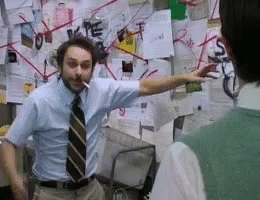
(Me preparing to explain to everyone the epiphany that came to me one dark, stormy night).
Hetalia is a series with literally no plot. Like, zero. Some episodes may impact each other, but the overall series is episodic in nature. The only episodes you'd have to watch in order would be the ones going over the miniature love story between Chibitalia and HRE. And then there's the sequence of episodes going over the Industrial Revolution in season seven, and then the sequence of episodes explaining the relationship between Czechia and Slovakia. But that's it. And the Industrial Revolution and Czechia and Slovakia episodes aired in the latter seasons, long after the fandom was already very big and well established.
The episodes are largely adaptations from the original webcomic and thus are all a bunch of skits haphazardly thrown together. So I'll reiterate what I said earlier; there is no real, canonical plot to Hetalia. There are canon events and facts about canon characters, but seeing as the show is largely skits, they aren't tied down to any real narrative.
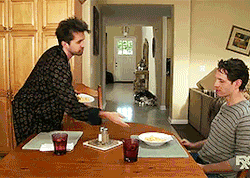
(The Hetalia fandom whenever they're given a piece of canon they don't like).
This leaves a lot of room for headcanons. Which leads to fans sharing their headcanons online. And when headcanons get super popular, they become fanon. And when a piece of fanon gets super popular, where it finds itself getting mingled with fanart, fanfiction, and even fan theories, you'll have people who start to confuse it with actual canon. There's really a lot to be said for the wild fanon of Hetalia, but I'll get to that another day. I need to turn the focus back onto the characters themselves.
I'm just gonna put it out there. The Hetalia characters are largely one-note. This isn't to say there isn't some depth to a few of the characters, but these characters are largely the epitome of "what you see is what you get." Especially in the early days of the series. The characters all have a set of straightforward, basic character traits, with their interpersonal relationships often being displayed in a very simplistic manner.
For example, Italy is a pasta-loving coward who's a massive flirt. Germany is strict and authoritative with a no-nonsense attitude. Japan is quiet and soft-spoken, only speaking up when he feels the need. America is a bombastic dork with a hero complex. England is an arrogant stick in the mud. France is a hopeless romantic who flirts with anything that has a pulse.
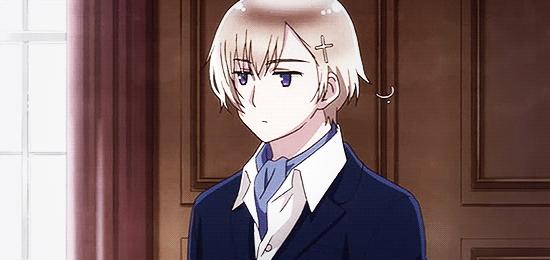
(Me taking a moment to pause and push away the cringy middle school memories of me shamelessly fangirling in class).
And as I said, their relationships are typically portrayed as simplistic as well. Italy annoys Germany, but Germany doesn't want to get rid of him because he's one of his only friends. England and France hate each other. America is that hyper-extroverted friend trying to get his introverted friend, Japan, out of his shell. Switzerland and Lichtenstein have a sweet sibling dynamic. And Prussia and Austria are portrayed as old friends who like to antagonize one another.
Because of the way the characters and their interpersonal relationships are written, this also lends them open to a lot of headcanons and eventual fanon. Not to mention that most of the characters have canon, human names. So if you want to use these characters in a fanfiction, particularly one where you don't want to depict them as countries (which is most fanfics), you have names at the ready that you can use.
And because of the simple way the characters are written, you can potentially write or portray these characters however you want in fanwork without too many people complaining that someone "isn't in character." There is so much room for your own interpretations of the characters. As long as you keep some of their basic personality traits from the series intact, you can portray the characters however you want. Especially because there's no real canonical storyline to drag them down. Because of the lack of canon storyline, you don't have to worry about fanworks being canon-compliant, canon-divergent, or canon-adjacent.
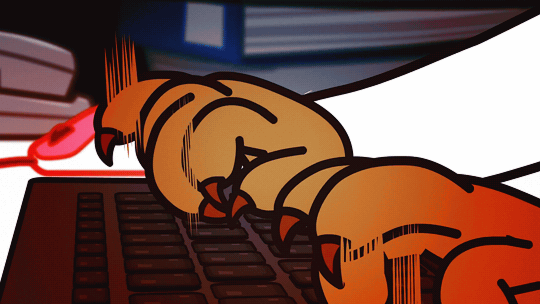
(Fanfic writers when they realize canon cannot stop them from creating whatever they want).
Do you want to portray Romano as the notorious mafia boss, Lovino Vargas, in the 1930s? Go ahead. As long as you can keep some of his cowardly and stubborn nature intact, you can do what you want with little trouble.
Do you want to portray England as the infamous pirate, Arthur Kirkland, in the 17th century? As long as you maintain his disdain for France, have at it!
Do you want to write a college AU with all of the characters present? As long as you keep in mind their personalities and have a basic understanding of their interpersonal relationships, have fun!
Now you're probably sitting there thinking, "Big deal, people can create all kinds of fanwork, regardless of what its content is, or what property it's for. What makes the Hetalia fandom so special?"
It's special because, since Hetalia is a series with almost zero canonical storylines, and the characters are portrayed in such a simplistic way, both of which lend their way to boatloads of headcanons and fanon, as well as small scraps of canon information that we can choose to either ignore or elaborate like crazy on...
Hetalia is a freaking goldmine for creating all kinds of fan content.
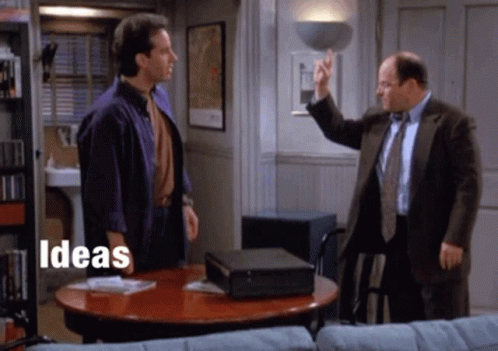
(Hetalians when creating the 2p! variations of the characters, probably).
So much fan content is out there. From creepypastas, to Hetaoni, Dreamtalia, the 2p! characters, historically accurate AU's, school AU's, and so, so much more. All because the canon is just loose enough to allow all kinds of fan content to be created and not seem too far off from the series or characters.
And that fan content ends up being way, way more fun than the actual series itself! Don't get me wrong, I still love the show, but I'd be lying if I said I didn't (or currently don't) have a freaking blast every time I engage with fan content. The creativity is insane, and the fanon is even more fun and entertaining.
The reason you cannot fully leave the Hetalia fandom isn't just because of Associative Memory, but because of the immense amount of fan content and fanon where, because of the nature of the series, you can do, write, draw, and create whatever you want. You can project onto these characters and their stories and interpret them to your own personal tastes. And you know what? That's a heck of a lot of fun.
And there you go, that's my two cents.
#hetalia#aph#hetalia axis powes#hetalia fandom#aph fandom#hetalia fan#aph fan#hws#hetalia world series#hetalia the beautiful world#hetalia the world twinkle#hetalia world stars#hetavet rambles
194 notes
·
View notes
Text
Finished reading Trigun/TriMax a couple days ago and have been feverishly trying to piece together a timeline, so here’s the result of that ✨
EDIT: as of 3/13/24 this has been UPDATED
For a more detailed timeline (with vol/ch marks): google sheet
Full res of the graphic (& other resources): bit.l/trigunresources
Notes & rest of the timeline under the cut!
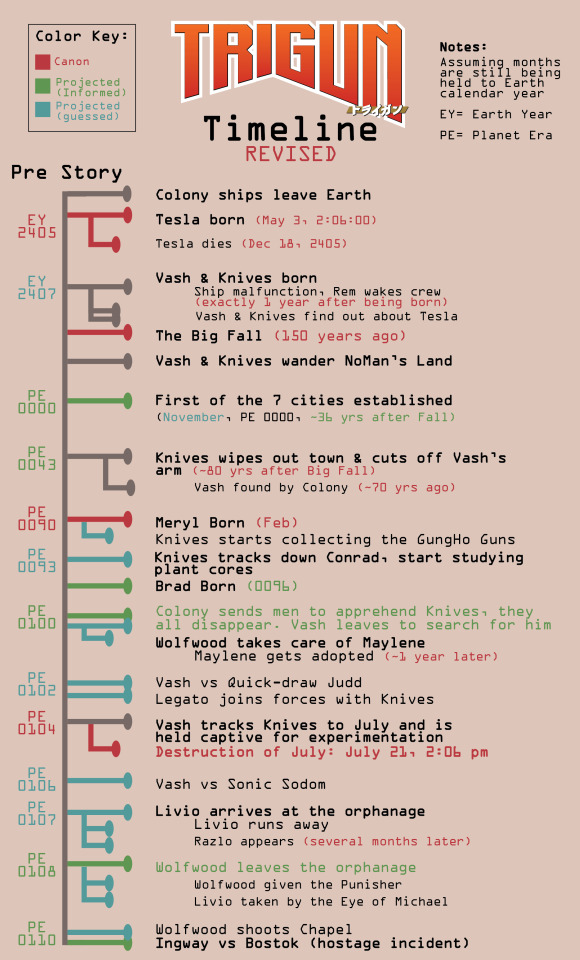

Edits as of 3/13/24
The detailed spreadsheet is organized and color coded! If you'd like a more concise breakdown of events/see some of my reasoning behind certain time stamps feel free to skim through that
Changed where in the timeline the Maylene and Wolfwood events happened (originally where I had placed them would have made Maylene like 6 when she and Wolfwood reunited which is NOT correct)
moved where in the timeline Knives started collecting the GungHo Guns (at latest he started in 0090 (20 years before 0110) since it's noted that Monev has been training in a cellar for the past 20 years
Moved where Knives initially tracked down Conrad (felt like it needed to happen at least a decade before July)
Changed up some of the months (personally, I don't think the Ark launched in December, since that'd put Milly and Meryl's arrival to the colony in July, which wouldn't make sense. So I placed the ark launch in October which of course offset some of the other month stand ins)
Added an earth year for when Knives and Vash are born. The explanation is I think at minimum there was at least a 2 year period between them and Tesla (since Rem was around for that whole process). I do think it was more than that, but that’s the earliest possible year I think it could have happened. Personally I’m more in the camp of 5-10 years, but def not 50 like in tristamp
Old Notes:
If you see any typos or phrase inconsistencies: no you don’t 💕 (😭)
Blue text can be completely ignored, that’s just kinda my personal preference/wild guesstimating of when “exactly” those events happened
Blue lines can also be ignored, they’re also just rough guesstimates on where exactly in the timeline these could have happened
The distance of the lines from one another doesn’t really mean anything, I started trying to follow a system to notate when things happened really close together but it was//// not consistently done ngl
Fun fact: by the time Wolfwood leaves the orphanage Meryl is 18! And she was 14 at the time of July’s destruction
Additional fun fact: Brad is 17 when he and sensei meet up with Vash in the Factioned city (which I think is absolutely RIDICULOUS), and we know this because he was 4 the one/last time he had met Vash and it’s been 13 years since
It was noted by Karen, one of Meryl’s coworkers, that she and Milly had been on assignment with Vash for about 4 months. (Might be that they were out searching for him during that time as well, but I’m choosing to interpret it as they were actually with him for that amount of time)
I’m also working on a 98 timeline for comparison (but more like just sequence of events cause I don’t think I have the patience to sift through the lore quite as much… mainly making it just to clarify how the anime delineates from the manga)
I am//::: feeling v unhinged after this and feel like it could be improved/i need to do a more thorough read, but I’m calling it quits for now before I actually go insane (but hopefully some people will find it somewhat helpful!)
Also: if anybody has any notes to add or clarifications/corrections I would be more than happy to hear them 👂
#resources#posts that broke 100#Trigun maximum#Trigun#trigun manga#TriMax#used my last and only braincell on this I swear#also guess I’m expanding on my blog organizing tags —>#timelines#btw this is updated!#trigun resources
335 notes
·
View notes
Note
What does it mean for something to be structurally well written but bad character-wise, plot-wise, or in execution? In theory, it seems similar to the “there’s no bad ideas, just bad execution” thing, but people seem to use it in a different way. In particular, I’m not sure how the execution can be different from how good the characters or plot is-it sounds like an umbrella term to me, but I think I maybe be missing a little bit of context.
I think it varies so much because they are all different things but can so closely overlap (I remember in one of my narrative theory courses we talked about the difference between events, sequence, and plot like ad nauseam... and all of it has basically left my brain). A lot of it also comes down to what is considered 'good' for each of them, which can vary wildly and be very subjective. So this is, at least, how I think about them!
» Structure: the overall themes and messaging of the story, usage of foils and parallels, for ex. This is like, Concepts rather than execution. The ability to decipher the intention of a thing (i.e. this character arc is about learning to trust) even if it's not well executed, etc.
» Plot: the events of the story. Character A went to Place B, etc. Ideally, the plot will help enhance the structure (a character who learns to trust will have to confront a person who betrayed them at Place B, etc) and stakes/execution etc.
» Characters: the personal manifestations used to tell the story. They can be used as tools (pieces of theme) which can be separate entirely from their characterization (personality, interiority; which can take precedence over their tool-ness). They are typically vessels of likability or intrigue to make us want to care about the other shit (worldbuilding, plot, etc) if the story is character driven > premise or plot driven.
» Execution: how all of these things, arguably, are brought together and/or disparate from one another. For example, while Sleeping Beauty and Snow White have structure and plot similarities — a beautiful sleeping maiden is awoken from her cursed 'death' with a kiss from a prince — but how they get there is wildly different; Snow White's curse is very sudden, Aurora faces a slow build of dread because you always know it's coming, even if she doesn't. Snow White is accordingly simpler as a story, whereas Sleeping Beauty engages (lightly at least) with fate as a theme.
For a story of how all these elements can merge (nor merge) together, I'm going to talk about Frozen because I think it's a specifically really good example to use to break down all of the above:
Structurally:
Frozen is about sisters, and specifically the reconciliation of the sisters. There are themes of family and the importance of being open with others in your life; Hans provides a subtheme of why you shouldn't rush in to just trusting anybody. (We'll get to him later, believe me.) For Anna, she's rewarded for her determination and love, and doesn't really change as a person throughout the movie; Elsa, comparatively, does, learning to let go of her fear surrounding her powers and how to embrace them (scaffolded under learning to let herself be loved). This provides a subtheme of people doing bad/dangerous things out of fear.
Plot:
Sisters fight. Elsa runs away to avoid (not feel/deal) with her problems and creates winter out of fear. Anna pursues her, is injured, comes back, is betrayed by Hans. Elsa is likewise dragged back to their kingdom. Hans almost kills both of them, Anna saves her sister even if that means sacrificing herself, and that ends up saving her. Elsa gains a better understanding of her powers out of it and ends the winter. Happy ending.
Characters:
If the plot demands for Anna to go after her sister into the cold, then Anna must be a determined character. If Elsa's plotline requires her to try and hide her powers, then she must be a more secretive character. The add ons to make them endearing, tbh, is that Anna is plucky and out of her element (highlighting her determination and love), and Elsa is anxious (whereas another character could've been secretive and resentful) because she doesn't want to hurt anyone, which keeps her sympathetic even as the harm of her powers escalate.
Execution:
So now that we have all these factors understood, how does the movie actually apply all of them? Frozen is very much a movie that checks off all its structural boxes — the story is indeed about trust and love and fear (themes), and the sisters do reconcile after a magically created divide — but the execution falters routinely when it comes to Character Agency and Consistency, particularly for Elsa and Hans, respectively. This also hampers its themes and overall story execution.
For example, the true monarch fleeing the kingdom out of fear, leaving it in disarray, initially ignoring the person who came to bring them back and fix the problem, only to eventually make things right and reclaim the throne is also the Plot Structure of The Lion King. However, whereas Simba makes the choice go home and face Scar — even when he still believes himself responsible for his father's death, even when he doesn't know if things are going to work out — Elsa is dragged back against her will. She then escapes and attempts to leave, placing even Anna's care in Hans' hands. Elsa has effectively no agency post-Let It Go, and the story never seems super bothered by this, or the way she only unlearns her primary character flaw (avoidance and running away) after everything else has already been comparatively fixed (Anna has saved her and has thawed). And because her agency is nuked, her character arc also feels really underdeveloped. She has basically 3 stages (childhood powers are good, childhood powers are bad for 90% of the movie (minus let it go), childhood powers are good again) with very little in between the last two stages, which is what should arguably get the most focus.
Hans is also a character who gets a major short end of the stick (and takes both the girls down with him) because of his lack of character consistency. It's more than "oh he's a twist villain, so you can't see it coming"—it's that his actions at the Ice Palace make zero sense if he wants the throne.
The Duke has one of his guys lined up to take the shot and kill Elsa, which Hans already defaults to being necessary to end the winter like 10 minutes later; he's already in charge of Arendelle with Anna MIA and he was planning on staging an accident for Elsa after the wedding to Anna, anyway; and here, he can have someone else kill the queen with witnesses and zero involvement for him. He has multiple reasons to want her dead, and none to actually want her alive, but he... spares her anyway, for some reason? Because the plot needs her alive, so they have him shot the arrow upwards toward the chandelier to Maybe take her out (and him checking it out is animated) which is also dumb, because if it was on purpose that'd make him more responsible for her death (which he seemingly wanted anyway in that scene!!) than just letting the guy take the shot.
So Hans doesn't really make sense as a twist villain, and I'd also argue him being one completely negates a lot of Anna's agency as well. Rather than realizing for herself which man suits her better or who she trusts more, she's hung utterly out to dry and then has Olaf point it out to her. Even though your partner doesn't actually have to be Evil to be Not Right for you, and that's a message I wish we saw a lot more in kids media.
However, Frozen is also an exceedingly easy move to fix in a variety of ways.
When writing a story, we all have various options to get us to the same outcome — say, a character needs to realize they have courage, and we know we want a haunted castle involved — so these are the Frozen Fix-It situations, I think.
Elsa escapes the prison, but decides to stay in Arendelle to try and find Anna in the storm and solve their problems together, rather than attempting to actively flee again. This is the simplest fix and gives her more agency (though it doesn't really fix Hans and Anna's situation: maybe Elsa redirects the arrow herself at the Ice Palace, and he doesn't really do anything).
My personal favourite: Hans is the antagonist, but he's not a Villain. He genuinely cares about Anna and thinks he's in love with her; he kisses her and it doesn't work. He thinks that in order to save Anna and the kingdom, he has to kill Elsa, and goes to do so with immense regret/remorse. Anna is pissed at him post her de-thawing, but Elsa steps in, and reminds her that people do terrible things when they're scared (stronger theming). Elsa forgives/pardons Hans, but it's clear she's forgiving herself too (agency). Hans and Anna realize that while they care about each other, they're not that well suited, and she picks (rather than being handed) Kristoff.
Option 2 the one that keeps the most of the movie's plot structure while also changing the most, comparatively, and while I'd still have gripes with it (looking at the trolls; looking at Elsa's agency, etc) it's kind of the movie I'll always wish Frozen would've been if they'd just let it be a bit more complex and consistent.
So Frozen, as is, is a movie with a decent plot and good characters, but weaker theming and poorer execution: it's a fun movie, but a structurally broken one, to me. Conversely, there can be stories like The Lion King that have a much stronger structure, but maybe the characters aren't as compelling or some feel underdeveloped, etc. The overall shape of the story is strong, but the ins and outs and scene by scene execution is iffier.
Hope this helps and if you have any more questions or specific examples you'd like to send in, absolutely feel free!
26 notes
·
View notes
Note
out of curiosity, do you have any ships you enjoy? or pairings that arent romantic? its possibly the last thing i would expect you to talk on your blog so (excluding some posts)
laughed a little at this message I guess I really don't talk about shipping... awesome. I partake in some from time to time and there Is some stuff I really enjoy but it tends to have low output... well,
lara/yulia (p1): I am a HUGE YULILARA FAN which is a low bar since there's like 3 of us. what is there to lack?? yulia and lara textually were once close friends, then had a falling-out (partially over yulia's fatalism and hypocrisy), and now they're bitter. really easy to read as exes. I love human suffering I think that's the point of pathologic so I'm mostly into pairings that won't work out :-)
yulia/maria (p2/3): okay hear me out I have privileged information (read the quest titles in quarantine) But this will be good. and it's even good from what we have so far. I love women who are mutually jealous of each other's relationship w/ eva + hate each other on ideological grounds + have nasty sex. aglayulia (didn't make this list but I enjoy it) makes it even crazier... me when my detested aunt comes to town so I torture her ex about it.
artemy/the fellow traveler (p2): deal ending is the best ending and choosing to reject mark's play and travel forever with the one person who's been consistently kind to you is the Best choice for har2spex. the Entire scope of anything in the world could be reached by deal ending artemy/ft. the motif of "a fate like a good wife"/"escaping fate" frames him as a romantic partner. "now that we're inseparable, I'll hold you tight". it's so good MY PLAYLIST
artemy/grief (p2): bartemy nation. artemy and grief are obsessed with each other however you slice it in p2 (you told your gang I'm your best friend and they all recognize me on sight? I bring you up unprompted in various conversations? we had a secret lair together?). it's really fun in that context of a long timeskip (read 301, a great piece of writing), but also just a great dynamic during the game, especially considering the direct parallel between grief asking artemy to escape + aglaya's escape. one of VERY FEW patho ships where the parties involved have a history and also get along in the present day
aglaya/artemy (p1/2): another really good dynamic but this time it's even canon. I think every day about their p2 escape sequence and how integral that is to the game's themes (...how fucked a mistake it was to doom that + how it was handled even worse for nara). compelling (author's note: I forgot to finish writing this paragraph please imagine I did that, will be left for another post)
daniil/eva (p3): honorable mention since this is topical today. I'm neutral on it in p1, but I think it has a lot of potential for p3! Mostly if the writers show eva's survival to be incompatible with the utopia. Trying to save her makes sense as the core of a game that's now about time travel... we've seen what happens when Dankovsky doesn't stop her and lives with the linear time consequences in 1, and I'm really into the idea of rearranging everything else that happens to the Town in hopes of avoiding that. whatever's being set up with the "married to his work" theme is going to work nicely with establishing a choice between his mission/eva, and it's a beautiful parallel with p2's "fate like a good wife" theme, And it means we'll have to look at eva's rationale and interiority in more than just an optional task that lasts 1 day. it's also like... I love characters being forced to grow and I love that the scene we have of them in quarantine includes dankovsky apologizing to eva, it seems like a very Groundhog Day attempt at altering the course of events. hopefully can + looks like it will be good. 🙏
vasily filat/me (p3): you know it.
#pathologic#asks#anonymous#there's a lot that I'm just neutral or impassive on tbh which I'll reblog just for variety. IF they ever get posted.#grief/rubin andrey/grief andrey/rubin trifecta + anything with anna... not a big vibe for me but I support our valiant 'rarepair' troops...#wait I'm also very into daniilpeter p1 I just don't think abt it much
30 notes
·
View notes
Text
Tethered.
CHAPTER FOUR: The Second Cup.



Summary: a nightmare’s accusations linger, blaming you for his darkness, but your dad’s quiet presence and a gift from joel remind you—you’re just human.
Warnings: nightmares, slight hints/glimpses of her past toxic relationship. | WC: 3K
Previous Chapter | Series’ Masterlist

You wake up too early, the kind of early where the world teeters on the edge of existence, suspended in a liminal space where time feels like it’s holding its breath. The sky outside your window is a soft, muted gray, a canvas of indecision—neither fully night nor day, as if the universe itself is hesitating, unsure whether to let the sun pierce through or allow the stars to linger just a little longer. The air is unnaturally still, save for the faintest whisper of wind that brushes against the blinds, nudging them with a subtle creak that feels almost like a warning, a quiet signal of something restless, something unsettled. The dawn, it seems, is as uneasy as you are.
Inside, you are anything but calm. Your chest feels like it’s been bound by invisible cords, each breath shallow and labored, as though the weight of the night has seeped into your very bones, anchoring you to the bed. Your heart is a wild, frantic thing, thudding against your ribcage with a relentless, erratic rhythm—a drumbeat that refuses to quiet, each pulse a reminder of something you can’t quite name. It’s as if your body is trying to outrun itself, to escape the cage of your own skin, the sensation raw and electric.
The nightmare lingers, its tendrils coiled tightly around your mind, refusing to release their grip. It’s not the kind of dream you can recount in clear, linear detail—no tidy sequence of events to piece together like a puzzle. Instead, it’s a mosaic of fragmented sensations, vivid and visceral, each shard cutting deeper than the last. The heaviness that pressed against your chest, as if gravity itself had turned against you. The trembling in your limbs, each muscle taut with a fear you couldn’t shake. The cold, slick sweat that coated your skin, as though your body were trying to purge the terror through every pore. And his voice—God, his voice. Sharp and accusing, it sliced through the dream like a blade, each word honed to wound. It was a voice that carried the weight of judgment, laced with a venom that made your insides twist with a sickening blend of fear, guilt, and something darker—something that made you question the very core of who you are.
“You always do this shit.”
The words echo in your mind, a relentless loop that grows louder with each repetition, reverberating through the hollow chambers of your thoughts. They’re not just words; they’re a weapon, each syllable sinking into you like a barb, drawing a line in the sand that feels impossible to cross. They twist in your gut, a knot of nausea and dread, tightening with every breath you take. The accusation is a living thing, wrapping around you like a noose, its weight suffocating, its intent clear: to make you feel small, to make you doubt yourself, to make you believe you’re the one who’s wrong.
“You make me act like this. I don’t want to fucking— I don’t want to be like this, but you make me be .”
Your breath hitches, a sharp, involuntary gasp that catches in your throat, as if the air itself has turned against you. He’s blaming you—twisting the narrative until you’re the one responsible for the cruelty in his words, the venom in his tone, the darkness that festers beneath his surface. It’s a distortion so seamless, so insidious, that it blurs the line between reality and fiction, leaving you grasping for what’s true.
“If you didn’t push me, I wouldn’t have to—”
The sentence dangles, unfinished, but the threat is unmistakable. His voice trembles with it, a barely restrained fury that wraps around your mind like a tightening coil, leaving you gasping for air, struggling to break free. The words hang in the air like a guillotine, poised to fall, their weight heavy with implication. If you didn’t push me. The insinuation is a masterstroke of manipulation, shifting the blame onto you, as if your mere existence—your voice, your needs, your presence—were enough to provoke whatever darkness he carries. It’s a lie, you know it’s a lie, but in the suffocating grip of the nightmare, it feels like the only truth that matters.
The details of the dream blur after that, dissolving into a chaotic swirl of images and emotions. There were no fists, no physical blows—thank God for that small mercy—but the violence was there all the same, woven into the fabric of the nightmare. Slammed doors, each one a thunderous punctuation mark in the argument, shaking the walls of your mind. Accusations hurled like daggers, each one sharper than the last, slicing through the fragile boundaries of your sanity. You remember trying to speak, to defend yourself, to push back against the tide of blame, but your voice was a traitor. It was trapped, lodged deep in your throat, a foreign thing that refused to break free.
You were stuck. Trapped in a cycle of accusations and guilt, unable to move, unable to breathe, unable to escape the weight of his words. And the worst part—the part that claws at you now, that keeps you awake in the gray half-light of morning—is that you believed him. In the nightmare, you let his words seep into you, let them worm their way into the cracks of your mind like a slow, insidious poison. You let them convince you that maybe it was your fault, maybe you were too much—too loud, too demanding, too needy, too something that justified his reaction. You believed it because, somewhere deep down, a part of you felt like you didn’t have the right to argue. He loved you, didn’t he? He wanted the best for you, so if he said those things, there must have been a reason. You must have done something to deserve it. Maybe you did push him. Maybe you were the problem.
You inhale shakily, the air cold and sharp against your lungs, and force thyself to sit up. The sheets are a tangled mess around your legs, clinging to your skin like the remnants of the dream. The weight of it lingers, an oppressive fog that refuses to lift, pressing against your chest, making every movement feel heavy, deliberate. In the quiet aftermath, with nothing but the soft creak of the house and the faint rustle of the blinds to challenge it, the fear feels like the only truth you’ve ever known.
But it’s not the truth. You know it’s not. Somewhere beneath the layers of doubt and guilt, there’s a spark of certainty, faint but unyielding, that refuses to be extinguished. It’s small, fragile, but it’s there, whispering that you are not the problem, that you are not the one who’s broken. It’s a voice you’re still learning to trust, still learning to amplify, but it’s enough to pull you out of bed, to set your feet on the cold hardwood floor and move forward, one step at a time.
The house is silent as you slip out of your room, the kind of silence that feels like it’s holding its breath, waiting for something to break it. Your footsteps are soft, barely audible, as you pad down the hall, the shadows stretching long across the walls, pooling in the corners like ink. The familiarity of the house is a small comfort, its contours etched into your memory from years of wandering these same halls in the early hours, chasing sleep or fleeing nightmares. The faint creak of the floorboards, the soft hum of the refrigerator in the distance, the way the light filters through the blinds in slanted, hesitant beams—it’s all part of a rhythm you know by heart, a rhythm that grounds you, even now.
As you descend the stairs, a new sound reaches your ears—a faint, rhythmic clink, like a spoon stirring in a mug. It’s a small, ordinary sound, but it’s enough to anchor you, to pull you out of the fog of your thoughts and back into the present. You know immediately who it is. Your dad, the only other soul awake at this godforsaken hour, tethered to his early-morning routine like a ship anchored to the shore.
You find him in the kitchen, exactly where you knew he’d be, bathed in the soft glow of the overhead light. The room smells of coffee, the sharp, earthy scent curling through the air, mingling with the faint tang of dish soap from the sink. He’s standing at the counter, his back slightly hunched in that familiar way, wearing the same ratty t-shirt he’s had since you were a kid. The fabric is faded, worn thin at the shoulders, the logo on the chest barely legible, but it’s as much a part of him as his quiet, steady presence. His reading glasses perch precariously at the end of his nose, slipping down as he stirs sugar into his coffee with a slow, deliberate motion, lost in the ritual of it.
He doesn’t notice you at first, too absorbed in his routine, but when he does, he lifts his head, his gaze settling on you with a quiet intensity. It’s a quick once-over, his eyes scanning your face, your posture, the way your shoulders slump under the weight of something unspoken. He sees it—the pallor in your cheeks, the faint tremor in your hands, the way your eyes are still clouded with the remnants of the nightmare. He sees it, and he knows. He always knows. But he doesn’t say anything. He never does. It’s not his way to pry, to push, to demand answers you’re not ready to give. Instead, he raises his mug, the steam curling upward like a wisp of smoke, and gives you a small, almost imperceptible nod.
“Tea?”
The word is simple, an offer wrapped in quiet understanding. No questions, no pressure, just the unspoken assurance that he’s here, that he sees you, that you don’t have to carry this alone. You nod, the motion small but enough, and feel the tension in your chest loosen just a fraction.
You slide into the seat across from him at the worn kitchen table, the wood creaking softly under your weight. The surface is scratched and scuffed from years of use, each mark a testament to the life lived here—spilled coffee, hurried breakfasts, late-night conversations that stretched into the early hours. The familiarity of it is a balm, soothing the raw edges of your nerves. The kettle on the stove begins to whistle, its high-pitched song cutting through the silence, and your dad moves with the same unhurried precision you’ve always known. He pulls a mug from the cabinet—a chipped ceramic one you’ve used since you were a teenager, its handle worn smooth from years of grip—and sets a teabag inside with a care that feels almost reverent. The hot water pours in a steady stream, the tea swirling and steeping, releasing a faint, floral scent that mingles with the coffee in the air.
It’s a ritual, one you’ve watched countless times, but in this moment, it feels like more than habit. It’s a lifeline, a quiet act of love disguised as routine. He sets the mug in front of you, the warmth of it seeping into your palms as you wrap your hands around it, the heat a stark contrast to the cold that still lingers in your bones.
“I swear, you’re always up earlier than the birds. The birds don't wake you up, you wake them up,” you mumble, your voice rough from sleep, the words catching slightly in your throat. It’s an attempt at normalcy, a way to bridge the gap between the nightmare and the present, and you’re grateful when he takes the bait.
He snorts, the sound low and amused, as he settles back into his chair. “Some of us don’t have the luxury of sleeping in ‘til noon.”
You raise an eyebrow, a faint smile tugging at your lips despite the heaviness still pressing against your chest. “You’re ancient. I get it.”
He tsk-tsks, shaking his head with exaggerated disappointment, but the corners of his mouth twitch upward, betraying him. “And you’re mouthy before seven a.m., that’s new. Thought we’d left that when you left adolescence.”
The banter is light, familiar, a dance you’ve done a thousand times before, and it’s enough to loosen the knot in your chest, to make the world feel a little less heavy. For a few minutes, there’s nothing but the soft clink of his spoon against the mug, the quiet hum of the kettle cooling on the stove, the faint rustle of the wind outside. The sounds of morning, small and ordinary, weave together into a tapestry that feels real, steady, safe. You sip your tea, the warmth spreading through your chest, and let the silence stretch between you, comfortable in its simplicity.
Your dad doesn’t push, doesn’t ask what’s wrong, doesn’t try to fill the quiet with empty words. He just sits there, his presence a quiet anchor, letting you be, letting the minutes pass as they will. It’s what he’s always done—given you space to breathe, to find your footing, to carry your burdens without demanding to know their weight. The nightmare begins to fade, its sharp edges softening, its grip loosening as the warmth of the tea and the steadiness of the kitchen pull you back to yourself. The fear that had consumed you, that had felt so real in the dark, starts to feel like what it is—a dream, a shadow, not the truth.
You’re not sure how long you sit there, the two of you wrapped in the quiet rhythm of the morning, but eventually, your dad breaks the silence.
“Oh,” he says, his voice casual but deliberate, as if he’s just remembered something. He sets his mug down with a soft clink, the sound sharp in the stillness, and reaches toward the counter. “Joel dropped by this morning on his way to work. Left something for you.”
The words catch you off guard, pulling you out of the haze you’d settled into. You blink, your mind scrambling to catch up. “For me?” you ask, the question tinged with confusion, your voice still thick with the remnants of sleep.
He nods, his movements slow and measured, as if he’s giving you time to process. He hands you a hardcover book, its edges worn and soft, the cover slightly scuffed from years of handling. You take it, your fingers brushing against the cool, weathered surface, and glance at the title: The Art of Surviving Yourself. You turn the book over in your hands, feeling the texture of the spine, the slight give of the binding, the faint creases that mark it as well-loved, well-read.
“What’s this?” you ask, your voice soft, almost hesitant, as if you’re not sure you want the answer. You’re still processing the strangeness of the moment, the unexpectedness of Joel—of all people—leaving something for you.
Your dad leans back in his chair, his expression thoughtful but relaxed. “Some book about how to get through the shit life throws at you. He said it helped him when he… y’know, had his own messes to clean up.” His tone is casual, but there’s a quiet weight to his words, a subtle acknowledgment of the struggles Joel must have faced, the battles he’s fought in silence.
You pause, the book heavy in your hands, and flick it open, your eyes landing on a random page. The words leap out at you, stark and unyielding, settling into your chest like a stone dropped into still water:
“It’s okay to feel like you’re falling apart. You don’t have to put yourself back together right away, or at all. Sometimes the pieces fit together in a way you never imagined. And sometimes that’s okay. It’s not about forcing yourself into a mold, or trying to find the right way to be fixed. Sometimes, in the cracks and breaks, the most unexpected things grow. That’s where you find yourself again.”
The words hit you like a wave, raw and unflinching, cutting through the fog in your mind with a clarity that’s both painful and liberating. They’re not just words—they’re a mirror, reflecting the parts of you you’ve been too afraid to look at, the parts you’ve tried to bury. The idea that you don’t have to rush to “fix” yourself, that the broken pieces might hold something beautiful, something new—it’s a thought that feels foreign, almost radical, but it resonates deep in your bones. Your throat tightens, your eyes stinging with the threat of tears, but you blink them back, focusing on the page, on the weight of the book in your hands.
You close it gently, as if it might shatter under too much pressure, and set it down beside your mug. The words linger, echoing in your mind, quieter now but no less powerful. You don’t know how to respond, don’t know how to process the strange mix of gratitude, vulnerability, and hope that’s swelling in your chest.
“He didn’t have to do that,” you murmur, your voice barely above a whisper, the words carrying a mix of gratitude and disbelief. Joel, with his gruff demeanor and quiet ways, isn’t someone you’d expect to make such a gesture, and yet here it is, tangible and real in the form of this worn, weathered book.
Your dad shrugs, the movement easy, almost dismissive, but there’s a warmth in his eyes, a small smile tugging at his lips. “Yeah, well. That’s Joel for you,” he says, his voice laced with a quiet amusement, as if Joel’s actions are entirely unsurprising, entirely in character.
You stare at the book, its cover no longer intimidating but inviting, a quiet promise of something you’re not sure you’re ready to face but can’t ignore. The gesture, the words, the simple act of someone seeing you—really seeing you—shifts something inside you, a subtle realignment that feels like the first step toward something new. You don’t know what you’ll find in those pages, don’t know if you’re ready to confront the truths they might hold, but for the first time in a long time, you don’t feel alone. The nightmare, the fear, the doubt—they’re still there, but they’re quieter now, overshadowed by the warmth of the tea in your hands, the steady presence of your dad across the table, and the unexpected kindness of a man who left you a book to remind you that you’re not broken, just human

Series’ Masterlist | Next Chapter

Taglist: @glitterspark
#by satinritual#dbf!joel#joel miller#joel the last of us#joel tlou#pedro pascal#the last of us#joel miller series#joel miller smut#joel miller x reader#joel miller imagines#joel miller imagine#joel miller fanfic#joel miller tlou#joel x reader#joel
26 notes
·
View notes
Text
IWTV S2 Musings - Tentative Timeline (Pt2: The Trial)
[The revised version is HERE]
I've been struggling with this for a while, cuz this ish just don't make sense, AMC. (I fully expect S3 to gotcha/retcon/fix stuff, esp. since who knows what Armand's tinkered around with in Louis' head.) I split this timeline in 2 parts: Pt1 has everything from 2x1 - 2x6ish (text & chart versions of timeline); and Pt2 covers as much as I can understand from the Trial's shenanigans. (I'm just one person tryna figure out wtf is going on, so if y'all have any insights, please share!)
I've been grappling with the sequence of events that led to the Trial since 2x6 aired, when Armand "could not prevent" his CHOICE to stand back and let Louis' family be abducted & tortured & killed.
Armand was actually in cahoots with Santiago the whole time (writing/directing/editing the Trial script); so was he also lying/making excuses about why THE most powerful vampire with the Mind Gift wasn't reading his own coven's thoughts?
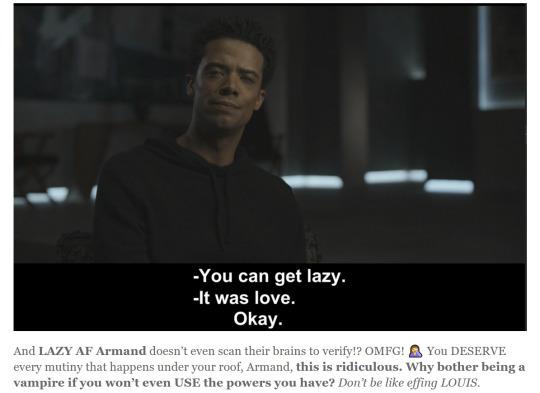
So, since we know Armand put false memories into Lou's head about the Trial (which ofc makes Louis' account more difficult to parse), and we know Armand knew all about Lestat/Bruce since the very first day, I've just been wondering how early the Trial was planned out.
Cuz the BIG question everyone's circling around is WHEN Lestat arrived in Paris, and WHY he didn't warn Louis that the coven was planning something.

Theories range from:
Les willingly participated in the Trial, deliberately acting with ill intent cuz he was mad about Mardi Gras; "it's their turn to hurt." Lesdaughter Truthers are wrong, Les DGAF about Claudia.
Les was unable to warn Louis or stop the Trial cuz he was captured, injured & manipulated/mind-fogged (a la the book canon)
Sam Reid (deliberately?) hemmed & hawed about Lestat going into the rehearsal/Trial acting on raw impulse, with no plan whatsoever, other than getting Louis (specifically) out alive
NGL, I think ALL of the above are to some degree true! 😅
But I lean toward Theory #2 most of all, cuz that's how the book events transpired. But I'll be the first to admit that #2 is deeply flawed & hard AF to defend/prove, based on what little we actually saw in 2x6, 2x7, and esp. 2x8. Cuz it really does seem like Les LET an awful lot of bad ish happen that he too could've prevented.
So I wanna put 2x6 into context this time, to try and piece things together. Cuz the math REALLY ain't mathin, AMC.
What we have thus far:
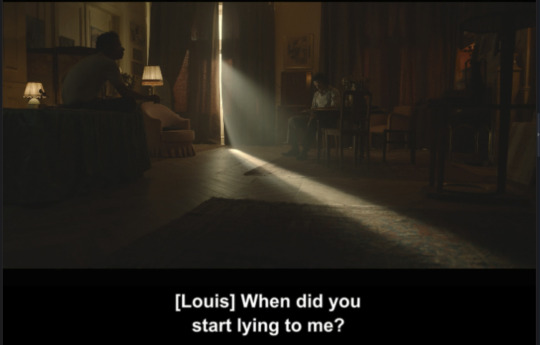
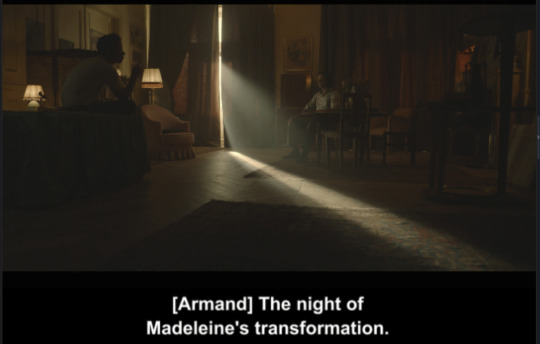
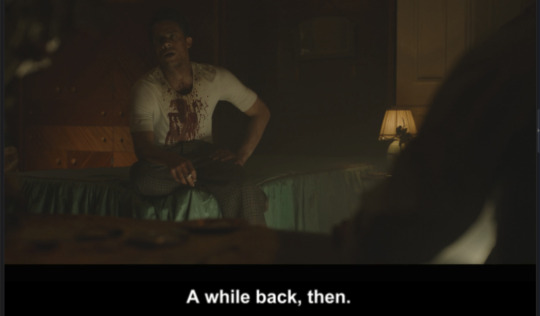
According to Armand in 2x8, he started lying to Louis about the coven preparing the Trial the night Madeleine was Turned in 2x6.
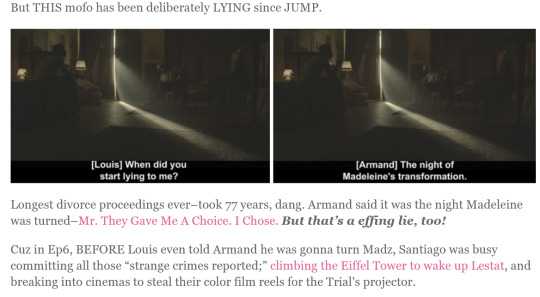
November 1945
Armand knew the FIRST NIGHT Louis & Claudia arrived in Summer 1945 that they were lying about Lestat/"Bruce."
Spring 1946 - Spring 1947
The coven was suspicious the entire time--it's esp. obvs. as Santiago grills them about "Chicago":
Santiago vs Claudia (2x3) around Spring 1946, "Stick with it, Puce! You're almost there."
Santiago vs Louis (2x4) around Spring 1947, "New Orleans!" (It makes sense that it would take Santiago longer to confront Louis, as Armand kept complaining about Louis never being around the Theatre x x)
Late 1947 / Early 1948
post-September 1947, Santiago had already stolen Claudia's diaries & passed them around to the coven; and Celeste & Estelle had already interrogated Roget about Lestat.
Did Armand know Santiago was in Louis' apartment going through their things (while Claudia would either be out with Madeleine, or at the Theatre under curfew) --
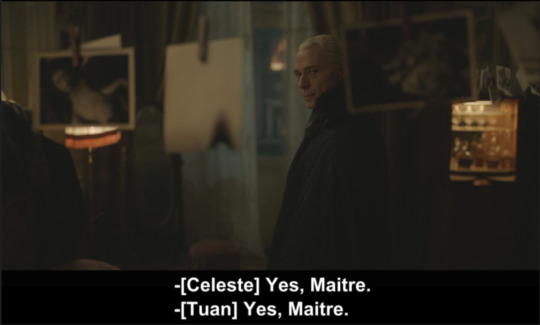
--and did he know the coven was reading her Diaries right in front of him while Santiago & Celeste & Estelle were interrogating Roget about Lestat?
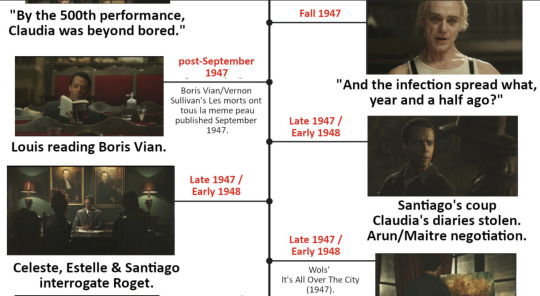
Esp. since all of this goes down in 2x6 BEFORE Armand had even met Madeleine & Louis/Claudia asked him to Turn her!
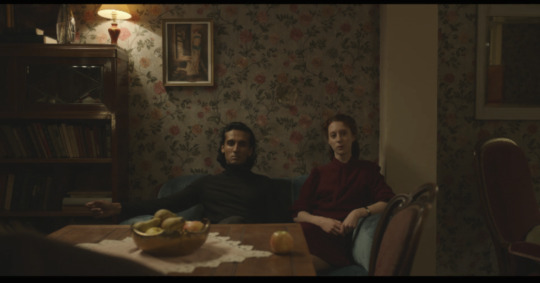
We know that by late 1947 / early 1948 (when Louis bought the Wols, then came home to find Claudeleine in his coffin, then took them to Armand to ask for the bite), Armand already knows that Lou & Claudia wanna do their own thing with Madz; committing the same "crime" that got Santiago's Maker killed--making a vamp without the Coven Master's permission--but ofc, Louis is NOT in Armand's coven.
Late 1948 - Early 1949
In the very next scene, we get Santiago & Sam in cahoots about Godot's projections/scripts. Patterns of behavior indicate that Armand LET this all happen, and only pretended that "the buffoon was in the audience."
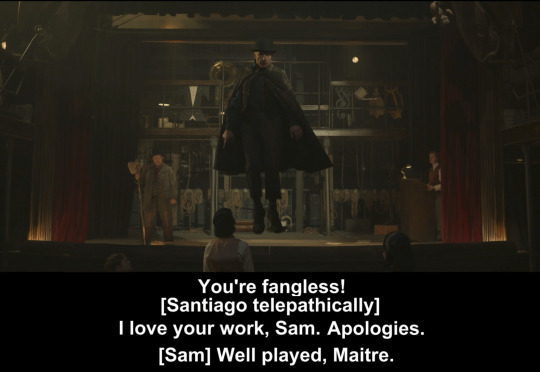
In my Timeline Pt1, I surmised that the very latest Sam could've finished the Godot script was early 1949, cuz IRL Sam Beckett wrote the play b/t October 1948 - January 1949.
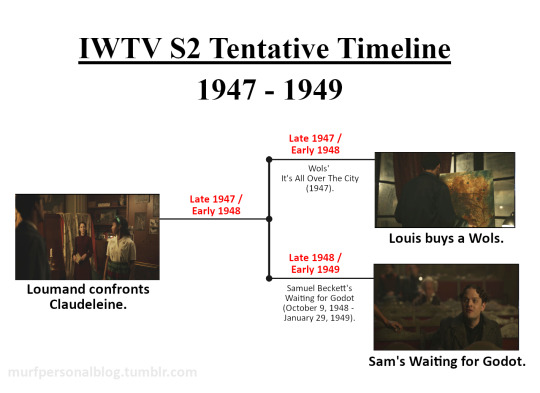
Spring - Summer 1949
So by Spring of 1949, Sam would be free to turn his attention to drafting a NEW script...for the Trial.
April 1949: Sam writes the Trial script.
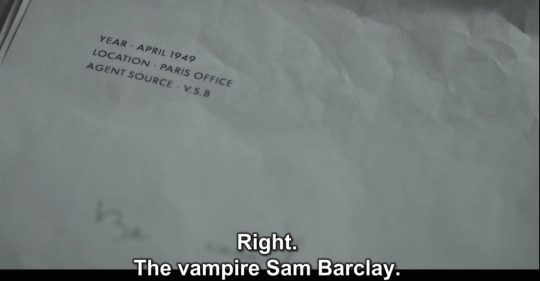
(Is it JUST his half, or is Les already awake & in Paris & writing the other half with him? OR is Les awake & just in telepathic communication with the coven, and has no idea they're asking him questions to incriminate Claudia & Louis?)
2x5 & 2x6 also give us some very important contextual dates! Loumand references a bunch of events that happened around the same time, which can help approximate when Tuan's projections were being made.
LOUIS: The Berlin Blockade ended in May. The Geneva Convention was agreed in August. Some of the front pages from that year. But if you look in the filler, in the back pages. Strange crimes reported. ARMAND: A telescopic lens stolen from the Observatory at Meudon. A film company shooting the crime thriller 'Porte D'Orient' delayed when its inventory of color film stock is snatched. LOUIS: A gang of drunkards, hanging off of the side of the Eiffel Tower, all facing south by southwest, all muttering in unison--gone by the time police arrive by elevator. ARMAND: Crimes all left unsolved.
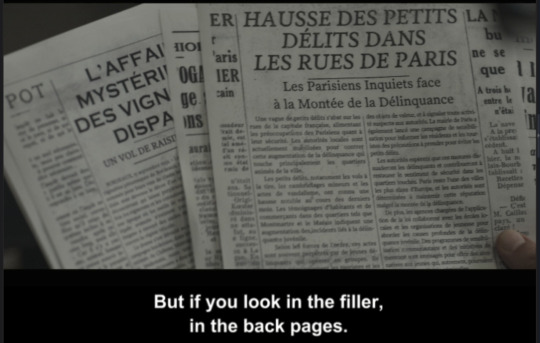
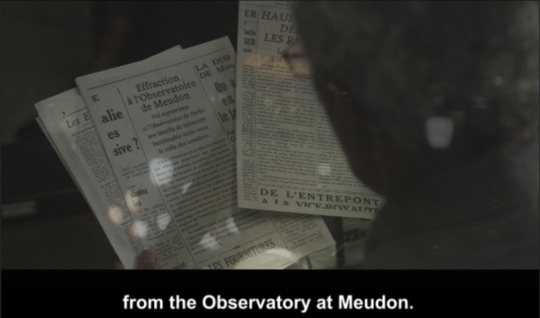

May 12, 1949: Berlin Blockade ends
June 21, 1949: Paris Observatory's missing lens reported stolen. (Because these are newspaper reports, we might also assume the actual time of the theft was the night before the article was published (June 20). But who knows.)
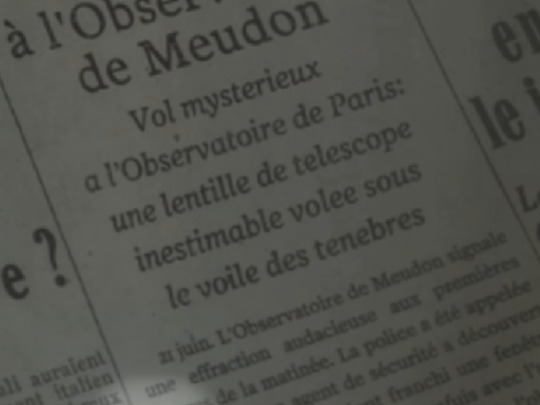
June 23, 1949: Oriental Port color film stock reported stolen; filming delayed. (Because these are newspaper reports, we might also assume the actual theft of the events was the night before the article was published (June 22). But who knows.)
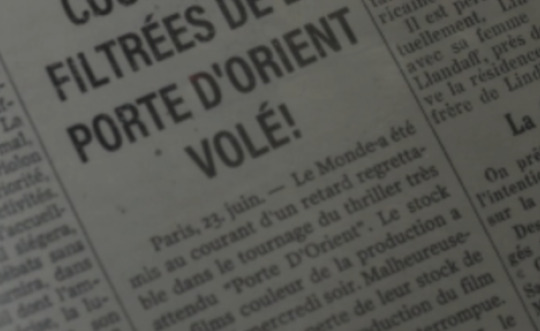
The color film stock being stolen that delayed Oriental Port's filming is a VERY nice touch, cuz the movie was released in 1950, and was the first French film to use Agfa-Gevacolor film, which had only been available to the public since January 1949 (x x). So the film nerds at AMC really stay on top of their research! 👌
July 1949: Armand distracts Louis with library outings:
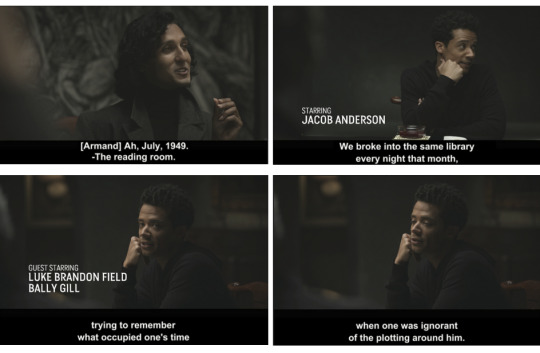
ARMAND: Ah, July, 1949. The reading room. LOUIS: Mmm. We broke into the same library every night that month, hypnotized security, as one does, flipped the lights, laid our backs on long tables and stared up at the ceiling. ' DANIEL: Hot. ARMAND: Iron pillars holding up terracotta domes, a light trick that made the ceiling appear higher than it was. LOUIS: And why not pass a month that way? An effortless, eternal life ahead of us. Funny thing, trying to remember what occupied one's time when one was ignorant of the plotting around him.DANIEL: Grab that. LOUIS: Santiago had broken into our apartme--I'm sorry. Grab what?
Louis implies that the "plotting around him" started in July 1949--or at least, that's when HE surmised (in Dubai, NOT Paris) that Armand had "started lying to me." Ofc, 2x8 would reveal that Armand was in cahoots with the coven since jump.
We can thus assume that this was when the bulk of the projector images based on Claudia's diaries were being drawn (whenever Armand wasn't distracting Louis with dates to the library). They already have the Agfa-Gevacolor film, and the Observatory's fancy projection lens, so that Tuan can animate whatever Sam had already written for the script. "But they had their Technicolor film. Tuan Pham's wizardry with it."
And ofc, they'd want to corroborate the diaries with Lestat's own testimony. (Esp. since it's clear from Claudia's diaries that Les ISN'T dead, just thrown in the dump--cuz Claudia KNOWS the only way to be sure you've killed a vamp is to burn them, and she's mad AF that they didn't do that to Les cuz Lou freaked TF out.)
Again: did they only call Lestat after they had Claudia's diaries (once they knew there was a chance he wasn't dead after all)? The dates seem to imply that this was the case--that Armand & Santiago & co. had suspected Lestat was alive ever since 1945, but it was only until 1949 that they bothered to contact him.
Fall 1949
September 5, 1949: report of Eiffel Tower climbed by "muttering drunkards." (Because these are newspaper reports, we might also assume the actual time of the events was the night before the article was published (Sept 4). But who knows.)
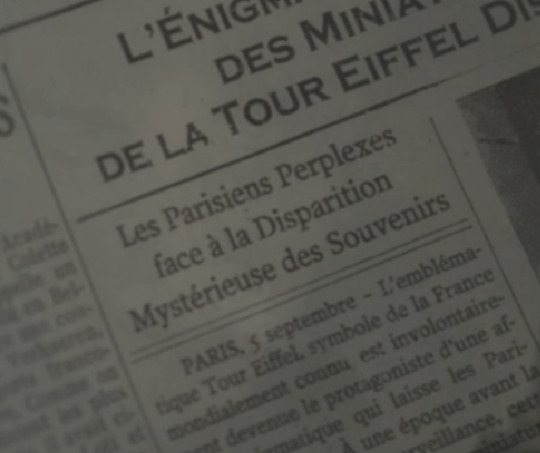
The September 5th date is the most telling: IF Armand is telling truth, this would be when the coven contacted Lestat, as seen in Tuan's projection during the Trial.
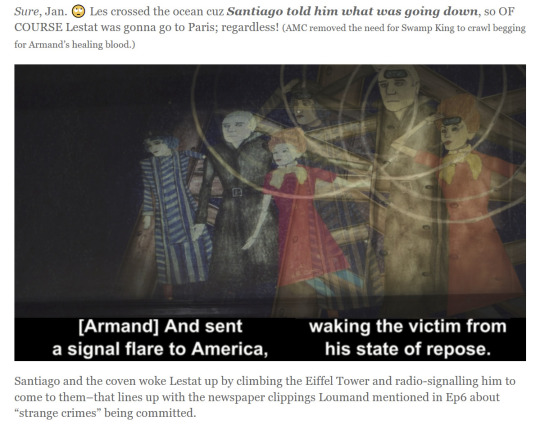
So, IF this is the truth & S3 doesn't retcon anything, the rehearsals with Lestat would've had to have started in September, after 3 months of Tuan's prep (the thefts started in June); and 5 months of Sam's writing & Armand's edits.
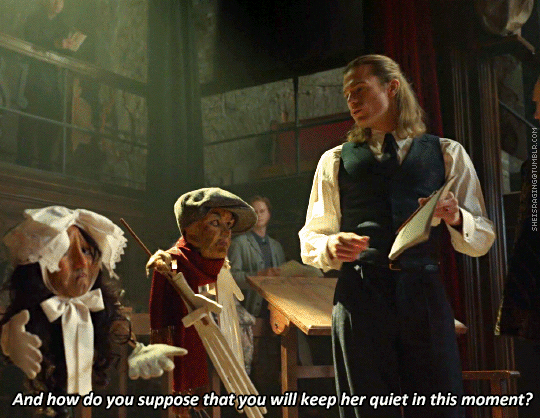
February 6, 1940 - September 5, 1949: Lestat's "state of repose" ends when the coven "wakes" him. (IF this is true, Roget was right that Les was just asleep, taking a long AF dirt nap. IF Les was awake before then, he was only motivated to come to Paris when the coven climbed the Eiffel Tower & told him the Trial was soon--likely still too emotionally damaged / psychologically injured to leave NOLA.)
Again, the big question is: what was Les up to while he was in Paris, b4 the Trial? Was he free to come & go as he pleased (in which case: why TF didn't he warn Lou?!); OR was he locked up (a la the books)?
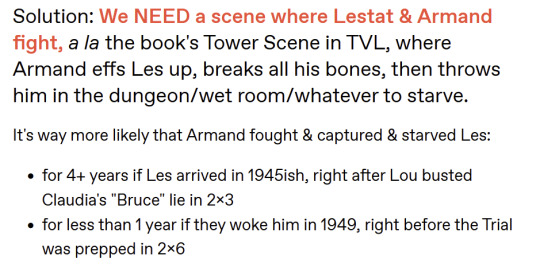
post-September 5, 1949: Madeleine is Turned.
Right after the scene of Dubai!Loumand describing all the "strange crimes," we get the scene of Paris!Loumand in the park, discussing Madz, right b4 she's Turned that night (Lou's in the same clothes).
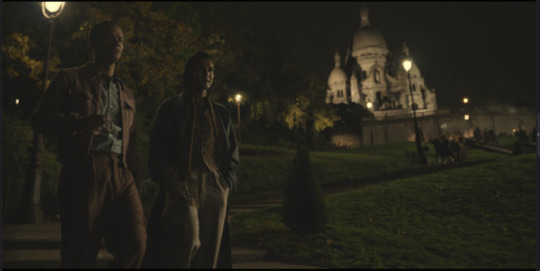
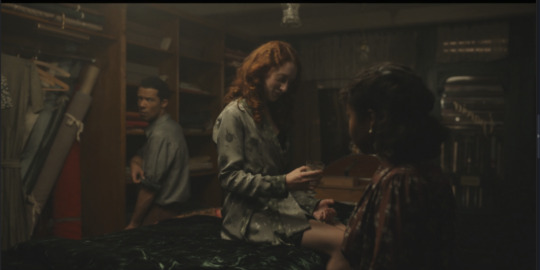
THIS is the night Armand claimed he started lying to Lou, ("They gave me a choice"). And again: we know even THAT was a lie too, cuz UNLESS Madz was turned the exact same night that Les arrived AND wrote his half of the script AND rehearsed it (meaning Les wasn't starved/tortured at all), then Armand had PLENTY of time BEFORE Madz Turned to work on the script & direct the rehearsals.
The same night of Madz's Turning, Armand moves into Louis' apartment (and Claudia's coffin 🤮), with his magnolia sprig. And speaking of plants....

September-October-ish, 1949: Claudeleine finds the X, planting flowers outside Saint Denis.
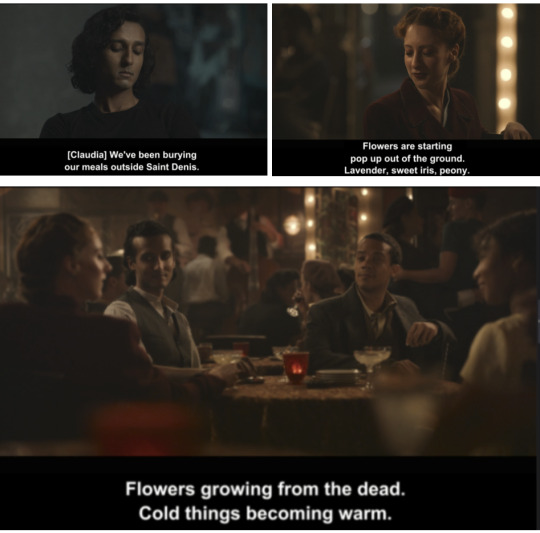
I assume "cold things" are the cold corpses Claudeleine is burying; that "become warm" metaphorically, when plants/flowers grow over their graves. I know nothing about autumn weather in France. Going by clothes, it looks like it's still nice & warm, cut comfy enough for light jackets. I also know nothing about flowers, or what seasons they grow in France. But apparently Claudeleine's Fall flowers are fine:
Lavender: usually stops flowering in late August or mid-September; definitely by mid-October.
Sweet Iris: has high cold resistance, and goes dormant from November - March-ish.
Peony: apparently there are regular peonies & tree peonies, and they both like colder weather--the regular ones go dormant around November. Plenty seem to be ok in Fall, up to October-ish, that you can get at nurseries. And they really like bone meal as fertilizer, omg. XD
(My headcanon wants to assume that Claudia only agreed to visit Louis in Paris either cuz it was gonna be her birthday (9/21), OR his birthday (10/4). 💔 Cuz misogynoir, I'd bet Monopoly money it was Claudia's; DOOMED by the narrative! 😭)
Late 1949 (September/October): The Trial.
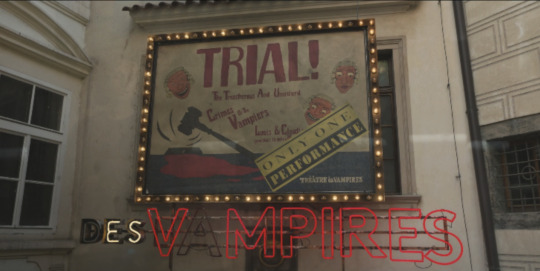
(Guys. D'you reckon those nasty theatre kids held the Trial on frikkin Halloween? 🤣)
Late 1949 (November-ish): Louis is kept buried alive in the wet room for at least 1 month after the Trial, before Armand finally pulls him out the coffin.
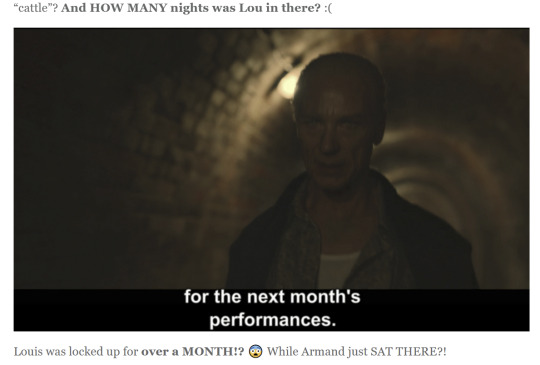
The latest the Trial could've taken place is October, in order for OVER a month to have passed and the fire still happens in 1949.
VERY Late 1949 (November/December): Louis slaughters the coven, the "Great Fire of 1949" send the Theatre des Vampires up in flames. 🔥
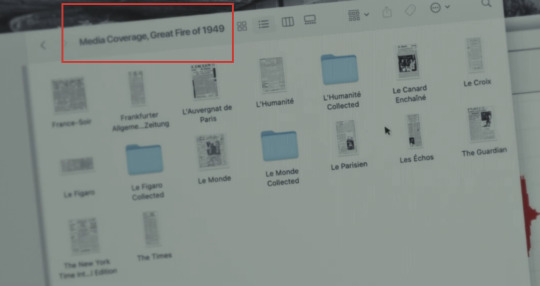
(The Talamasca folder in 2x3 calls it the "Great Fire;" which makes me giddy, cuz we also have the "Great Burnings" in the books, related to Akasha. I love how Akasha & Louis are paralleled, just slaughtering vamps with the Fire Gift, bless.)
1950
May 24 - June 4, 1950: The French Championship of 1950 takes place at Roland-Garros. Spoiler: the Australians lost that year. 😂
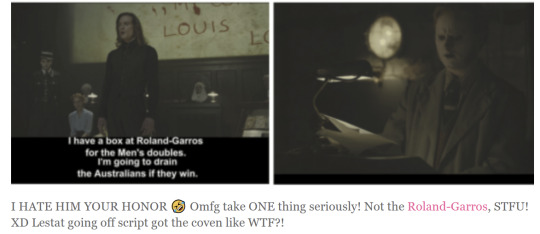
#interview with the vampire#iwtv tvc metas#loumand#the vampire armand#louis de pointe du lac#justice for claudia#i hate math
44 notes
·
View notes
Text
so we've spent the past three months writing MelloNear daily, and we've worked on enough different pieces in that time that i now have some Thoughts as to the narrative purposes they each tend to serve in our own works (this is not. about canon though i suppose it DERIVES from their canon dynamic. this is very much about how we personally play with the blorbos)
by and large Mello serves to drive the plot, regardless of the position he is put in within the universe. we don't even have to actively be trying to do anything with him -- even in our more Near-centric pieces, as long as Mello is present? his emotions, whims, wants are what shapes the trajectory of the story, his emotional beats are the beats that drive the plot forward. he feels, he impulses, he injects stuff into the sequence of events. things happen because Mello wants them to (or pushes Near to make them happen if/when he himself cannot).
meanwhile Near is much less of a driving force for the plot and more of a reflective force for the story. he isn't IRRELEVANT to the plot, he doesn't do NOTHING, but most of what he does from a plot progression standpoint is reactive. like, he acts not because of an inner drive, not based on his own wants or needs, but largely when his circumstances require action of him. (by circumstances i don't just mean Plot Events. sometimes what he reacts to are his own emotions, like in sweet atonement, when they are so overwhelming that he cannot put them aside to strategise effectively anymore -- the keyword here being "effectively", because even then his first response will still often be to try to strategise.) by and large what Near does do is provide space for reflection, for thought, for analysis. things happen to him, or through him, and he thinks about them a bunch, and he'd leave it at that if Mello wasn't pushing him.
so they make for super neat storytelling when you figuratively drop them together in a jar and shake them around, because it's like. Mello pushes Near into action Near wouldn't take on his own; and then Near adds weight to Mello's direction, provides a deeper sense of spacetime, fleshes out the places where Mello takes him that Mello wouldn't necessarily stop at or consider on his own. like at their core, in the way we write their dynamic, Mello Does and Near Is. and mixing them up, you get: all of the essential elements for a compelling story!
and obviously im not like, talking in absolutes, none of this is true 100% of the time or the only possible reading of them, nuance exists etc etc. but that's the general trends we're starting to notice in our own MelloNear writing over the past few months
#saltposting#death note#dn meta#mellonear#meronia#putting this in ship tag because i am Interested in hearing about if people write them differently/why/what you see#or more generally like what everyone's thoughts are on what i just said dhfsdf#like idk if this makes any sense bc its bedtime im literally hitting post & writing a 2-sentence idea i had#and then going to bed. snooze time#and a lot of this is Abstract Vibes and Trends In Our Writing (a good 3/4 of which is still unpublished)#but like. i couldnt stop thinking about this dichotomy for the whole time i was getting ready for bed#so Attempt To Word It And Thereby Feel The Shape Of It Better and then Post To Tumblr it is#writing post#OH MY GOD THEY'RE LITERALLY UNSTOPPABLE FORCE & IMMOVABLE OBJECT. JESUS CHRIST#im deeply unwell about that. oh god. ive hit on a Personal Truth about how we envision their dynamic#and the whole post can be summed up in. five words. unstoppable force vs immovable object.#I AM DEEPLY UNWELL
28 notes
·
View notes
Note
hello there, I would just like to say that you are an inspiration to me and my own writing journey. you have such a profound way of skillfully weaving a story, I adore your works. it really reminds me a lot of madeline miller and her amazing stories (I really like a specific style of writing, lol)
may I ask what your writing process is? I myself have trouble sticking to motivation and finishing my own works. hope this message reaches you well, cheers <33
(Long post warning, and sorry to the people still languishing in my inbox, especially anon who sent me a similar writing ask - I will get to it, but hopefully in the meantime you can glean something useful from this, too.)
Thank you! Also, yes - I came back to creative writing a few years ago (after many years of nothing but academic writing, grad and post-grad) around the same time Miller published Circe, and my ER work definitely pays tribute to that. In the genre of modernised(not modern)-greek-myth-retellings, hers are the only ones I tolerate. (That’s not true, I do like Pat Barker’s work to an extent, though she’s much less lyrical than Miller. But sometimes you need that).
To answer your ask, here's my writing process - but first, a couple of disclaimers:
Disclaimer 1: Everyone’s method is different, etc etc; this is a given. But I also have a decade’s worth of disciplined professional writing under my belt, which is very helpful when it comes to sitting down and just choking something out on paper, even when my brain is unwilling, or the spark is not there. This takes time to cultivate.
Disclaimer 2: No writing method or process is going to work if you are not actively reading. All the time. There is never a time I don’t have at least one book going. When I am feeling cheeky, I commit to four or five at once, all very different: novels (from disparate genres), edited volumes, anthologies, non-fiction; regardless, a wealth of different voices to draw from. If you are super busy, and we all are, at least try to read a bit before bed, it’s good for you.
Anyway! Process:
STEP 1: A thing I might want to write: a scenario. A scene. An interaction between two characters. A short sequence of events. A long history. This particular climax, and its aftermath. The POV of that particular character. How am I going to do that? What do I need to know? What are the possible approaches - which POV, past or present, told or retold, and in what manner?
Ex: before I sat down to write Litanies (Bloodborne), I knew I was interested enough to commit to a fic about the Fishing Hamlet. There are a million ways to do this. It was only while reading/watching certain material - journals, accounts of 19th century expeditions, a book about piecing together the mystery of a murder on another planet through conflicting eye-witness testimony, watching AMC’s The Terror - did it make sense to do an “interview” style, slow-burn mystery-box-esque piece, in which an interviewer has to piece together first-hand accounts of what happened (just like us, the Hunter!). Could I have done it another way? Yes. Would it have been nearly as interesting from a storytelling perspective? Not remotely.
Tdlr; Who and what will I write about? In what way, and how will that approach make the work even stronger? How many things do I need to clarify about where and how this is going before I start writing? The tighter your plan - it doesn’t even need to be written down - the less likely you are to hit a wall later because you don’t know where you’re trying to go or what you’re trying to say.
STEP 2: I start plotting scenes. For Vanitas (Elden Ring), I knew I wanted to write the history of Godwyn’s war and subsequent allegiance with the ancient stone dragons. I would need battle scenes, political intrigue and broader worldbuilding, alongside more intimate, dialogue-focused exchanges with Fortissax. On my shitty little notes app, I started writing these as they came to me, as I mulled over the ways to make them fight, meet, agree, quarrel, separate. Mostly, I start with the core of a scene - what is the question being answered, the main point, the crux of it? - and then build the rest of the scene around that. In that way it’s rarely, if ever, meandering and useless. Especially in short works - every scene should matter, and keep its focus where possible. You will be surprised how many disparate scenes you can merge into a single one for more impact.
Tldr; elevator-pitch style, what’s this work actually about??? And what scenes do I need for my readers to get it?
Big huge disclaimer here: at this stage, if I am starting to construct little bits and pieces in my notes app (everything from swathes of dialogue to jumbled “then he does this” reminders) they are in a very raw form. HOWEVER, at this point, I need to know how the story will end, especially if it is multi-chapter. I need to have outlined how these scenes flow into each other, and why. If it’s a vignette or one-shot, I need to know exactly what I will show, mood and message, so that it never becomes any longer than necessary, or loses the thread that holds it together, so to speak.
STEP 3: I have a lot of material in my shitty little notes app (this will vary, depending on the size of your piece. The outline of A History of Iniquity (Elden Ring) was about 8k, which makes sense for a work that’s gonna top out at 80k). It’s time to bring it over to proper writing software. There, I start sorting my notes into scenes, as well as supplementary material (stuff that feels useful, or important, like worldbuilding tidbits, but that I have yet to weave into the story progression). Personally, separating all my notes into these individual scenes makes me feel like I have a better handle on the work, and can bounce around from scene to scene without having to work in linear progression, which I almost never do.
Tldr; organise. Today I feel like writing scene 4, tomorrow scene 2. Because I have a handle on the work’s structure and I always know where it will end up, this is easy to do.
STEP 4:
Write it.
Sloppily, badly, plainly. Commit to writing a scene, or x number of words per day, and get it done. A bare minimum of what happens in that scene. Dialogue. Actions. This then that and then this. Just put it down.
This is my big secret: I am a good writer, but I am a better editor (alas, a thing you could never tell from the state of some of my Tumblr posts). Writing is the painful part. Editing is a joy. It’s all there - what is left for me to do but to make it smoother, shinier, more polished? Remove what is superfluous, add a punch where needed. I much prefer making a drab paragraph sing than the initial act of writing that paragraph.
I spend more time on editing than I do writing. I read, I reread. I go away. I come back, fresh, and reread again. I reread my work until I know enormous amounts of it by heart, then I go away, put it out of my mind, read something else, come back and edit again. There is no way around this, especially if you are writing fic and you don’t have a beta (or at least a first/second reader). It can always, always, always be better. The more aggressively you edit, the better you train your critical eye, and the sharper you are on your next first draft, or if you’re kind enough to beta for someone else. I am a ruthless editor (and I can and should be even worse), only because that’s what helped me, and I’d hope anyone better than me taking the time to look at my stuff would do me the same courtesy.
STEP 5: Publish, go away, cry. If it’s fanfic, come back and read it for some last little edits. If it’s in an academic volume, cringe and hope no one reads it (/jk. Mostly).
To come back to your initial point about motivation and sticking the landing - some of that is going to have to come from you, personally. On my end, I finish what I start for three reasons.
I do not truly start the honest-to-god writing unless I have that body of notes already, and it’s hefty enough to serve as a skeleton. If I’m unsure, I’ll often leave ideas in this nebulous state of notes/ideation until I can come back with a clearer vision of what it would look like as a finished piece.
I do not start unless I am 100% committed to putting this work out there. If it’s too daunting, I’ll write it as a vignette or a one-shot, which is great practice, and there’s no excuse not to finish one.
I do not start a work unless I know exactly how I am going to finish it. I more often than not know the last sentence of my work before I make it to the first draft stage. I know in amateur circles/fic writing it’s fine to just see where the work takes you, or leave the chapter count open, or whatever - it’s all practice, anyway - BUT I do think that if your main goal is closing a piece, then you need to be strict about how you get there. There’s plenty to do along the way, but at minimum know the scenes you need to make it to the finish line, and give yourself the tools to get there.
THIS IS SO LONG I am terribly sorry, clearly I lied about being a good editor.
Hope this helps!
#ask#writing#fanfiction#this is more advice than instruction so take it that way#also super important if you can: get yourself a beta!! it's motivating to be held accountable by someone expecting the next chapter#writing advice#writing process
15 notes
·
View notes
Note
I could rant all day about how bad the third film is because it fails at not only being an SA2 adaptation, but being a good story on its own merits as well. Mostly I just sum the whole thing up as "the Scary Movie version of SA2."
But yeah, it's very annoying when folks claim the film did it better, because every flaw that exists in SA2 also exists in the movie and does it worse to boot. Maria's not automatically fleshed out as a character just by being made quirkier if it ultimately means she's still relegated to fuelling Gerald and Shadow's manpain. She still lacks goals and dreams of her own, and is robbed of any last words.
Likewise, the plot is all over the goddamn place and probably wastes even more time than the game does. What was the point of the hallway dance sequence if Shadow could have just popped into the vault and swiped the key? What was the point of Rockwell's character? At least a third of the film could have been cut without taking away anything of substance.
Careless production values sprinkle a nice dollop of wtfery on top. $122 million dollar budget, and nobody involved in the production of this blockbuster pointed out that Tom and Maria were pointing at the wrong side of the chest. All those hours and manpower that must gave gone into editong, and nobody caught Keanu's conspicuous gulp of air while Shadow's mouth was closed.
They showed this in theaters! For money! Am I being punked?
(Not to mention you could make a drinking game out of the number of times Shadow utters the word "pain." Show don't tell whomst?)
Yeah that's the thing that gets me, is the movie is trapped in that same cognitive dissonance limbo as the IDW comics where it CANNOT be judged on its own merits as a stand alone piece of art. It literally REQUIRES knowledge of the video games to even be COMPREHENSIBLE as a narrative. And yet knowledge of the video games actively damages your ability to enjoy the movie.
If you somehow try to divorce the association with the video games, the plot of the movie becomes utter gibberish. If you ignore the video game plot and try to watch the movie as its own piece of media, you're left with nothing but questions like "what the fuck was the point of the chao garden cafe? How is Gerald even still alive after being in jail for 50 years, both because how would a human being naturally live that long and also because why wouldn't GUN just execute him? Where did Shadow come from? That's literally never actually explained or resolved, he just crashes on earth on a meteor? His entire characters existence is just one massive plot contrivance. Why is Shadow so strong? How does he have abilities like Sonics? Why is he stronger than Sonic when Sonic has been through two movies of fighting enemies but Shadow has never used his abilities for combat before in his entire life as shown in the flashback scenes? Why are they making such a big deal out of Sonic and Shadow turning super together with musical accompaniment? All they need to turn Super for is to fly back to the station, it's not like they're going to keep fighting or anything. Oh wait, they are going to fight? A bunch of robots?? Where did the robots come from? Why are there suddenly robots? Did the screenwriter pull them out of his ass just to give Sonic and Shadow something to fight? What is the significance of Shadow taking off his bracelets? Why do they need to use a ring to save Sonic instead of using it to send the ARK a safe distance away from Earth and Shadow can just go catch Sonic?"
And that's not even getting into all the problems with the script if you remember the events of the previous Sonic movies. Sonic 2 has them say that GUN was created after the events of the first film. Now all of a sudden GUN existed back in the 70s. These movies PUNISH YOU for actually REMEMBERING WHAT HAPPENED in them. You are PUNISHED for remembering the previous films, hell you're punished for remembering what happened FORTY MINUTES AGO WITHIN THE SAME FILM.
These movies, all three of them, are such a fundamental fucking failure as a piece of entertainment. They are DISGUSTING, DISRESPECTFUL, DISPARAGING AFFRONTS to the video games. And they are unwatchably boring mind numbing SLOP even if you ignore their association with the video games.
I genuinely don't understand how anybody can enjoy them. Fucking Marvel movies are more entertaining and coherent than these fucking films.
7 notes
·
View notes
Text
Okay I don’t want this to be like an obnoxious millennial assumption because I’m positive that every generation has things like this, but the way autism and ADHD was treated for us in the 90’s and how it affects adult diagnoses is like, imo, so integral to our coming of age and the stories we tell and the way we’ve gotten to know ourselves, even the way it relates to our job market and economy and how we operate inside it, and especially the way a pandemic uncovered it for so many people and exposed the cracks and revealed that we were all just barely functioning and held together with popsicle sticks and anyway
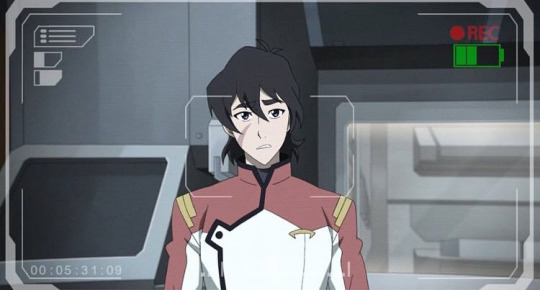
I say that because maybe it’s the un-diagnosed 90’s child in me but I feel particularly emotional about Keith’s arc in learning that he’s part Galra, and the way even the creators said they made him sort of prickly because of his biology, and I just !! Think so much about Keith’s neurotype as a part Galra!!!!!!!!!!!!!!
Cause something about being diagnosed later in life is like, looking back at all the other ways you tried to handle yourself, all the missteps, maybe even misdiagnoses. Like, how many times did you try to treat ANXIETY without realizing you didn’t have an anxiety disorder, you just can’t deal with your family blaring the TV from the next room? How many times were you told you were lazy, or lying, when you didn’t know what executive dysfunction is?
Keith is such a lovely rich character because his prickliness is EARNED—we know what happened to him, we know he’s traumatized, we know he’s been treated poorly by many people in his life. We know that he grew up thinking that he’d been abandoned by one of the people who should’ve loved him the most, in the whole world. He even questions that in his vlog—he makes the connection that he has trouble with people because of his mom.
But I just wonder like, how much of it is just his biology. Not understanding the body he’s in, being completely ignorant of one whole half of his culture. Had he ever mutated before the TBP fight? Did it take him by surprise, did it frighten him? ((* This is head canon territory LMAO there’s no way to really know—like, is he able to do this because he just spent so much time with Krolia, or does Shiro going That’s the Keith I remember mean they used to have really primal sex that turned his eyes yellow? Lol))
Like when we talk about even the most broad generic terms of saying someone is neurodivergent, we don't even need to put a real life label on Keith. Like he's literally not human! Of course his brain looks different! Of course he functions differently! And I wonder how much is nature v nurture -- if he knew the truth about his mom, if his dad had lived, if he'd been allowed a normal childhood, would he still have been a weird kid?
Cause like, even seeing the way Shiro is able to get through to him, we see ways that he allowed for thrill seeking, and he didn't judge Keith for stealing his car. It reminds me of like, what we know now about asking children to sit still in school, and how perhaps some children would do better with standing desks. Shiro wants him to behave and succeed, and doesn't judge him for being a car thief, and gets through to him by bringing him cliff diving. And it just feels like this clue, you know, that nothing is wrong with Keith, he's just living in a weird place where people don't get him.
It’s just really special to me, because there’s so many pieces in the sequence of events of Keith’s character arc, and I know I’ve said this a handful of times now, but I really sincerely believe it’s the only thing the show really nailed. Accepting himself during the BOM Trial -> MOMENTS later learning something very important about his biology -> spending time with Krolia -> coming back to pilot Black when he’s READY and WANTS to (unlike the first time, when he resisted) -> becoming a pragmatic strong leader by the end.
Gosh idk.
I don’t really have anywhere to go with this, it’s just something I was thinking about today and it gets me real emotional. Like, Keith must have had these moments, re-evaluating who he’d been before he’d known, finally understanding why he was Like That, and it’s so healing to imagine him accepting his past self and forgiving it because he understands now.
#hes just a lil baby#keith kogane#sheith#SPACE MAN META#i watched the lion king this morning and cried my eyes out and it got me so upset about keith LMFAO
39 notes
·
View notes
Text
S1E5 – The Doomsday Option Write Up P1 - Saturday (The last day of the World) up to "the wiggle on"
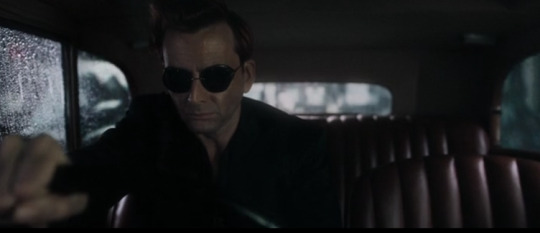
Let’s just get stuck straight in with this episode, shall we? Because that’s exactly what the episode itself does – we’re not really given any clues to remember where it is we’re picking up from (and given the way the previous episode’s events were stitched together, that’s a little surprising). So what do we have? Crowley, looking stony faced, driving in his usual fashion. Oh, and the Bentley has chosen to play Queen’s “You’re My Best Friend” as he speeds around London’s crowded roads. Maybe there is a little clue there after all. And when things are made more explicit for us, we’re shown that Crowley is trying to reach Aziraphale:
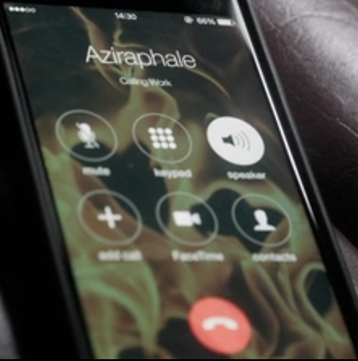
Aside from the fact that the number has been labelled as Aziraphale’s “work” number (which makes me wonder if there’s also a “home” contact somewhere in Crowley’s phone), the picture in the background is one of flames. I’m pretty sure Crowley wouldn’t have done that himself – it’s my thinking that this is foreshadowing for him, so it’s no wonder he’s driving as fast as he possibly can to get to the book shop.
Moving on, to Crowley’s entrance into the bookshop. There are two things I’d like to pick up on from his actual entrance. The first is that we see him miracle the door both open and closed, but for the first time there is no accompanying miracle noise, of any variety. There’s the noise of the bell on the door ringing, but no miracle sound effect. This is perhaps simply because there’s a lot of other noise and music going on at the same time, but it just struck me as odd because it’s different. The other thing I want to pick up on, which is still to do with the soundtrack, is that the Bentley’s choice of music follows Crowley into the bookshop, now playing in an off-kilter way via a warped record on Aziraphale’s gramophone. I think this opens up a really interesting can of worms about the reason behind pieces of music transforming into something else, but I want to give it some proper thought and time so I think I’ll write a dedicated post about it.
Now, the collective heart of the fandom breaks more than a little bit when Crowley storms into the bookshop screaming Aziraphale’s name without considering his own safety, right? How about when, for the first time in the season, refers to Aziraphale as his best friend in an angry tirade of abuse once he realises he’s not there in the shop anymore? The fact that he somehow senses that Aziraphale isn’t there is one thing, but have a little think about this: if it hasn’t already occurred to you, this will be the first time in 6000 years that Crowley has rushed to Aziraphale’s rescue and been too late. That particular gem of understanding came to me as I was writing this, and honestly it destroyed me more than a little bit. Crowley’s ability to sense Aziraphale’s absence however allows him to move straight from denial to anger in the stages of grief, and boy is he pissed.
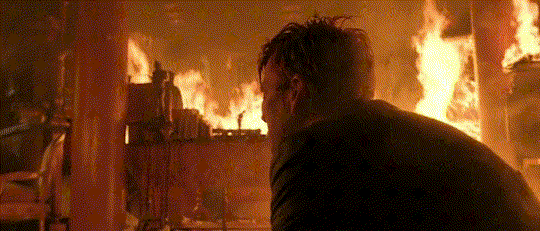
Right before we go into the opening credits for this episode (is this the shortest opening sequence for the series? It’s less than 2 minutes long!), we see Adam again, and there is no doubt that the Hellish powers that reside within him are taking control. If the glowing red eyes weren’t enough (I’m sure his eyes would have matched Dog’s if he hadn’t already eroded all the evil away from the Hellhound), the colour has all been washed out of this scene. It feels really grey and quite lifeless, in contrast to the bright and natural tones from previous scenes in the same place.
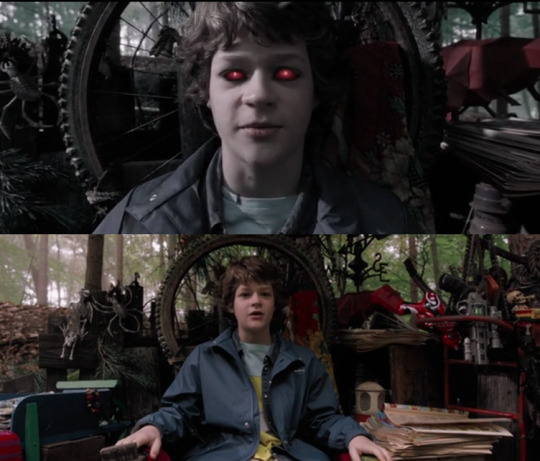
Now, Crowley’s exit from the book shop. As with his entrance, there’s no miracle sound as the doors open or close. Perhaps more importantly, it doesn’t actually look like Crowley does anything to close the doors as he leaves the shop. There’s no clicking of the fingers as we’re used to seeing – those doors close entirely on their own. Forcefully. There’s maybe a slightly forceful shoulder movement that coincides with the doors slamming, but that could just be Crowley’s signature swagger. Food for thought I think, it might be something I’ll look into in a bit more detail when I explore the music stuff I mentioned earlier. And speaking of music, how truly appropriate it is that we’re now treated to Queen’s “Somebody To Love”? Because with Aziraphale gone, Crowley has nobody to love anymore does he? And he is devastated about it. So devastated he takes his glasses off in public (which I think is the only time we ever see this happen).
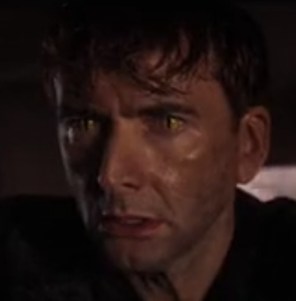
As an aside, I noticed a couple of frames during this rewatch where the sign above the door of the bookshop is slightly obscured, and you can only really make out the “C” of the “Co”.
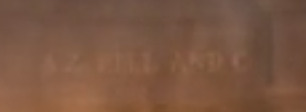
I’ve known the sign says “A.Z. Fell and Co” for a while, and wondered what the purpose of the “and Co” part of the title was (because of course we know that there are no other business partners involved in the running of the book shop), but it was only on this rewatch that the penny dropped. Having an “and Co” at the end, if you shorten the title to its component parts, gives you “A and C”. And didn’t I feel like a dumbass when I realised that one. It’s been staring us in the face the whole time, written above the bookshop entrance – a declaration of the partnership. I do not believe it to be a coincidence that the name written on the sheet for the telemarketer later in the episode is Cowwley, providing a further connection to the “and Co” reference. And did you notice the response Crowley gave the firefighter when asked he was the owner of the bookshop?
Do I look like I run a bookshop?
Oh Crowley. He didn’t ask you if you ran it, he asked you if you owned it. More food for thought.
I don’t have a lot to say about the next scene with Shadwell and Madame Tracy, other than to point out that we have another instance of the episode title being referred to within the scene itself – Shadwell refers to himself as “the Doomsday Option”. And although we have a direct reference to the lurid pink whip that he finds buried within the mountain of soft toys (and you have to love the whipcrack sound we hear on exiting this scene to go with this discovery), nothing is ever said about the fluffy pink handcuffs equally hidden in plain sight:
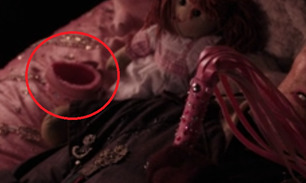
Quick question about Aziraphale’s arrival in Heaven. What’s the issue with his leg? As soon as he tries to walk on it, he calls attention to it in what appears to be pain. Not only did we not see anything happen to his leg in his discorporation scene, but technically he no longer possesses a body and in theory shouldn’t feel pain at all.
Do you remember all the way back in episode 3 when I mentioned that Aziraphale was the only one of the angels to be wearing any sort of colour or pattern, indicating that it was perhaps his own personal touch rather than part of a Heavenly uniform? No? Well, let me refresh your memory:

Well, now that he has arrived in Heaven without his human body or clothing and somewhat against his will, his trademark tartan touches have disappeared. His clothes are all varying shades or white and cream, with no colours or patterns, further strengthening the point I made when I brought it up previously. And regardless of how unwillingly he arrived in Heaven, it appears that his superiors were always adamant that he was going to be turning up – they’ve allocated him a platoon. As much as I know that Aziraphale can be an absolute kickass when he needs to be, the idea of him being in charge of soldiers at war at this point just feels laughable to me. And his confused expression would suggest he feels the same way.
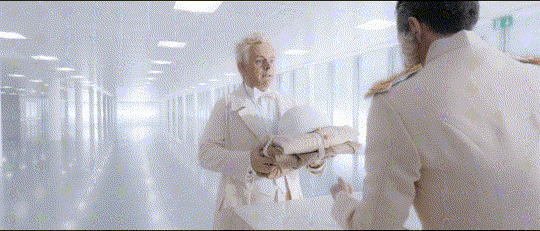
And perhaps the reason Aziraphale was limping towards the dispensing table after his arrival was because he doesn’t seem to know he is no longer in possession of an actual human body?
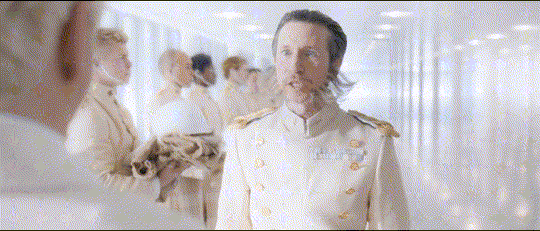
We’re about to get something we’ve been waiting for for quite a while. Aziraphale has finally come to terms with the fact that he isn’t on one particular side just because that’s where other beings expect him to be.

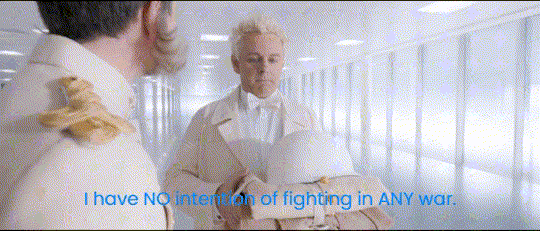
These couple of lines say so much to me about where Aziraphale’s morality lies at this moment in the timeline. He cannot renounce his angelic nature – it’s what he is after all – but he can reject what other beings believe that nature should consist of. It must hurt him to declare himself a pathetic example of what he is, particularly when he has always prided himself in actually being a very good example of a Heavenly being, of being “Good”. And we as the audience know that his nature is more in keeping with what we would like to believe Heavenly beings would be like – compassionate, caring, and kind. But really it’s Aziraphale’s free will that makes him all of these things – the one thing he told the archangels in the previous episode was something that wasn’t for angels, only for humans.
One last thing about this scene, and I’m sorry (not sorry), but it’s sound related again. There’s a little harp glissando and accompanying noise (two in fact) in the soundtrack to signify that Aziraphale has had an idea. It’s not dissimilar to the noise we hear when he does a miracle. I don’t think there’s anything important about it, I just like to draw attention to the little details sometimes.
What I do think is important is that Aziraphale’s realisation is that the powers of angels and demons are not actually very dissimilar, and may even be the same. It’s not really highlighted too much, but ultimately I think the main difference between the powers that angels and demons have isn’t capability but intent.
I’m going to skip quickly over the next scene in the woods because… well, see, here’s the thing. I don’t like it when things… don’t look right. I know, I know, it doesn’t make a lot of sense. Let me try and phrase it a bit better. The shots of The Them when they either don’t have a mouth or where their smiles are stretched too far for their faces FREAK ME THE FUCK OUT. Like, remember when people had those filters for Snapchat where they switched faces? That was a dreadful time for me. They didn’t look right. So I don’t like this scene in the woods. Let’s move on. Quickly.
Now we all know how much love birds get in this series. Ducks, swans, nightingales, even the occasional lark. Which is why my attention was drawn to the singular bird singing in the background during the scene in Anathema’s bedroom. It stood out to me because it wasn’t that long ago that a tornado was blowing right outside the window, and now you can hear a bird singing (if you listen really carefully). I am no birdsong expert, and I can barely hear it as it is, but if anybody can figure out what kind of bird it is, I’d be interested to know. It might be nothing, just some ambient noise from filming, but birds offer such prominent subtextual meaning in this series I’m not sure. Birdsong aside, the discussion between Anathema and Newt raises an interesting point for discussion around Aziraphale’s perception of humans having free will because it would appear that Anathema doesn’t have any – her entire life is lived by writings put down by a descendant hundreds of years previously. I suppose we could argue that she has free will in her choice to follow her pre-destined destiny instead of fighting it and making her own decisions, but I think it’s pretty clear that Anathema doesn’t feel like she has a choice, and that’s really what’s important.
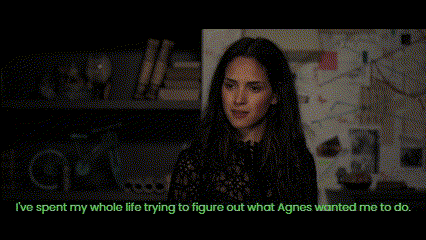
Alright, let’s go find what Crowley’s up to, shall we? Well first off, he’s just ordering his third bottle of Talisker. Not glass; bottle. Which the landlord appears to be very happy to serve him despite the fact that he is absolutely shitfaced. And that he’s ordering it by the bottle. We see Crowley at his most vulnerable in this scene, only really equalled in the Final 15, but at least here his vulnerability is cushioned with a big cloud of drunkenness. We do learn a few things about Crowley’s fall in his drunken ramblings, not least that he was bored in Heaven. The way he sees it, he just joined up with a couple of the cool kids to ask some questions about his job. There’s actually a little bit of extra dialogue in the script book about this:
They say, hey, Crowley, my man, we’re just on our way to discuss the whole job conditions and career advancements thing.
That’s not quite how Heaven tells their side of the story – according to them it was a rebellion with an accompanying war. I’d quite like to know which side has a more accurate memory of the events. Either way, Crowley’s verbal spewing at this point shows us how genuinely destroyed he is at what happened to him as a result of his questioning. Hearing his voice crack during “sulphur” tears me to pieces every time – it’s genuinely devastating. And the way he says Aziraphale’s name when he sees him “sitting” right across the table from him (his arrival announced with one of those stock miracle noises you’ll notice)? How much joy and hope (and love)? Something you can see mirrored in Aziraphale’s expression in the reflection in Crowley’s glasses.
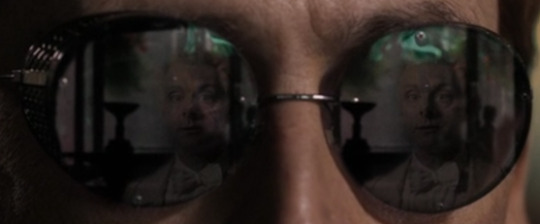
It's pretty obvious that Aziraphale can’t see Crowley in this scene, which just makes the angst run that little bit higher. But at least they can hear each other, and the first thing the angel says sounds almost like an apology:
I’m afraid I’ve rather made a mess of things.
His next thought, despite being extremely short on time to avert Armageddon at this point, is to determine whether Crowley has left without him or not. It’s pretty clear he doesn’t really want to ask the question, fearful of the answer I suspect, and what it would mean for them. Crowley’s got this handled though: a bit of nonchalance to try to cancel out the grief he’s really feeling.

Good job Aziraphale can’t see his face crumple at that point isn’t it? Can’t do much about the voice thick with tears though. I’m not ashamed to say that I misheard Crowley’s line the first time I watched this scene, and when I listened back I’m not surprised I misheard, because to me “lost” in this line doesn’t sound a million miles away from “love”. Deliberately contentious or not, Aziraphale definitely clocks the use of the phrase “best friend”, and you can see (and hear) how touched he is, because Crowley really can only be talking about him.
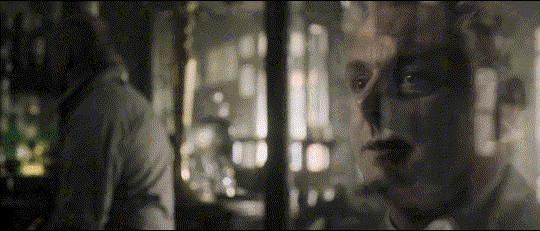
The angel deals with this revelation in the only way we Brits know how – by putting on a stiff upper lip, ignoring the sentimentality, and getting down to business (well, he is trying to prevent the end of the World I suppose). Poor Crowley is having a genuinely terrible day at this point isn’t he? First his attempt to rescue Aziraphale failed for the first time in 6000 years and now he has to tell the angel that his beloved book shop is burned down. The expression on his face shows how sorry he is to have give Aziraphale the bad news:
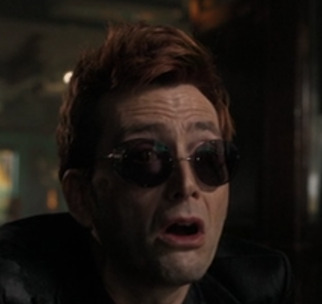
Oh, it’s genuinely awful watching Crowley trying to avoid saying the words that he knows Aziraphale will be destroyed by. Hardly surprising when you consider the look of utter devastation on Aziraphale’s face when he asks if it’s all gone.
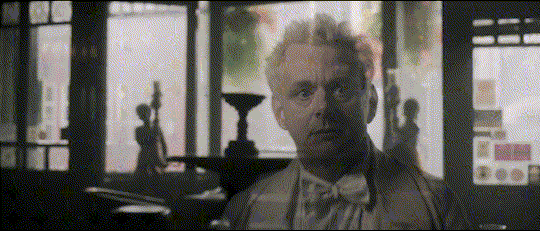
Crowley tries to find a positive to balance the negative out with, desperate to satisfy Aziraphale’s pleading, but knows there isn’t one. It takes him three attempts to give a simple “yes” answer. And just as we’re all about to start sobbing uncontrollably at this uncharacteristic display of emotional availability from both the angel and demon, spurred on by the horrible injustice of it all that Aziraphale can’t see Crowley and the world being about to end, the mood is lifted at exactly the right moment by the demon’s uncontrollable joy that he, somewhat miraculously, took the one book that he needed as a “souvenir”.
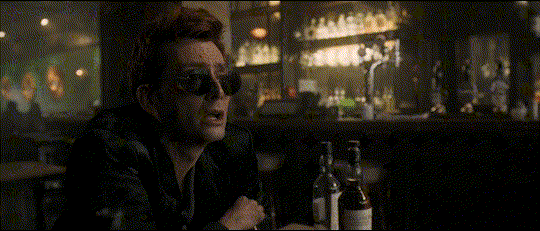
Happy as Aziraphale is that Crowley has the book, it’s pretty obvious that he wants Crowley to be proud of him for working everything out, but Crowley is so desperate to get to the angel that he misses his prompt. It’s very reassuring for us to see that they settle back into their old dynamic of not really listening to each other, and feeling mutually very comfortable with that, regardless of the pressing circumstances and the painful encounters that they’ve been through together in the last 24 hours.
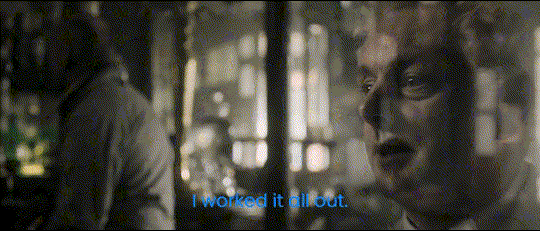
Can we just take a moment to appreciate that Crowley doesn’t wait to be asked to help Aziraphale, or hesitate to pick up his mantle as knight in shining armour? He tells the angel that “wherever” he is, he’ll go to him. That is one devoted demon right there.
And so we arrive at what I think is probably my favourite exchange in the whole of this season. I’m actually not going to delve deep into this interaction because I don’t really think anybody needs me to spell out the double entendres screaming from the subtext here. I tried, multiple times, to put into writing what exactly it was about this little handful of lines that I love so much, and every time I tried I just felt like I was devaluing the whole thing, so I’m just going to put a GIF here instead and you can watch it on a loop as many times as you like (I certainly have). Obviously, there’s no sound, but if you’re anything like me, you can probably hear the soundtrack in your head anyway.
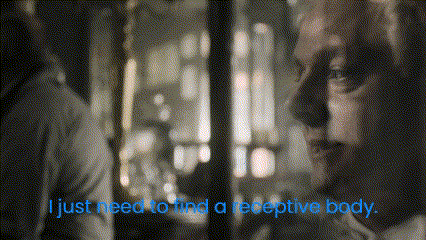
That feels like a pretty good place to stop for this part to me. As always, questions, comments, discussion, all welcome. See you next time 😊
#good omens#episode analysis#good omens season 1#ineffable idiots#aziracrow#ineffable husbands#aziraphale#crowley#crowley loves aziraphale#crowley's bentley#adam young#good omens soundtrack#good omens music#sergeant shadwell#the them#anathema device#newton pulsifer#crowley's sunglasses#aziraphale's bookshop
29 notes
·
View notes
Note
Happy friday! "Can you walk? I'd be happy to carry you" for Rook/Davrin!
Thank you for the prompt! Had some fun with this one, hehe.
For @dadrunkwriting (VEILGUARD FIC)!
Slight spoilers for the middle of the game, but nothing that spoilery lol.
-
A nice walk in Arlathan Forest with Davrin and Assan. It should have been the easiest, calmest hour of the whole week.
And then they’d taken one wrong step. It was a familiar sequence of events: their ankle went sideways, Aquile collapsed into an awkward heap, and grumbled a halfhearted curse. To add insult to (mild) injury, Davrin had seen the whole thing. Before Aquile could even begin to get back up off the ground, he asked, “You okay, Rook?”
Aquile sighed, exasperated. “Yeah, I’m fine,” they said.
He did not look convinced. “Do you usually fall over for no apparent reason?”
“Just twisted my ankle,” they replied. Not entirely true, but easier than trying to explain that their ankles were wobbly pieces of shit. “Mind giving me a hand up?”
As Davrin stepped closer, Assan dropped from the sky with an inquisitive chirp. The griffon peered at them for a moment, as if assessing whether his presence was needed, then evidently decided it was, as he planted his butt on the ground to watch while Davrin offered Aquile his hand. Aquile took it, and Davrin promptly hauled them back to their feet.
Much to Aquile’s irritation, the ankle that had folded under them twinged painfully as they put weight on it again. “Great,” they muttered under their breath.
“Rook…”
“I might have done slightly more than twisted it.” That was new—in all the times they had rolled an ankle, it had never done any real damage—but then they realized one critical factor. It was the same ankle they’d broken at Weisshaupt. Though they’d fought a fucking Archdemon on it while broken, they thought it had healed up nicely afterwards. Clearly not.
“Can you walk on it?” Davrin asked, his expression entirely too sympathetic for their tastes. “I’d be happy to carry you.”
Their cheeks burning, Aquile glanced away from him. It was ridiculous, really. He was just being nice. There was no reason to be embarrassed. And while Aquile was quite certain they could walk on it—it would just hurt the rest of the way—some part of them very much wanted to take him up on that offer.
Well, fuck. When did that happen?
Not that it was unusual for Wardens to get together. It happened all the time—after all, it was hard to have a relationship with someone who wasn’t privy to the countless secrets you were obligated to protect. Still, that didn’t make it a good idea. Wardens, after all, have a marked tendency to die.
“Uh,” they said, as eloquent as ever. “I mean, I survived Weisshaupt with a broken ankle—”
“And multiple broken ribs, a concussion, and more bruises than Assan has feathers,” Davrin said, deadpan. “None of which you told anyone about. All due respect, Rook, but I think it would be best to head back to the Lighthouse.”
They scowled at him. “And, what, you’re going to carry me halfway across Arlathan Forest?”
“Guess so.” A beat passed, then Davrin shot them a smirk that quite plainly said you don’t fool me.
“Well, if you insist,” Aquile replied with mock offense. “My knight in shining armor, and all that.”
He chuckled and took another step towards them, closing the distance between them to mere inches. Aquile was not that much shorter than he was, and yet he picked them up as easily as if they weighed nothing more than a sack of flour. They made a small, surprised sound, and as undignified as it was to be draped across someone’s shoulders like a hunter’s prize catch, Aquile was far more interested in how warm Davrin was. Feeling rather like a spoiled cat, they settled in for the walk back to the eluvian.Of course, being a healer, Aquile could have fixed their own ankle with a little delicate spellwork, but if it meant getting such dotingon from the big, scary monster hunter, well… who were they to complain?
10 notes
·
View notes
Text
The Last Temptation of Max Caulfield
Max’s nightmare in Episode 5 (by that I mean the sequence of events beginning with Max losing consciousness at the beach and ending with Max’s confrontation with herself in the Two Whales Diner) is in my opinion one of the most thematically important parts of the game.
The nightmare presents a warped version of reality, where everything is backwards, opposite to the truth.
In Mr Jefferson’s classroom, when Max is presented with a set of dialogue choices, she emphatically says she would never say any of those things.
In the hallway, Kate is resentful towards Max for saving her, even though in reality she was grateful.
In the labyrinth, even characters who have been nothing but friendly to Max, like Warren and Samuel, are hunting her down.
In the bathroom, Max has to enter a code reflected in the mirror – a clever bit of visual storytelling, signifying that everything in the nightmare is backwards.
The entire nightmare is designed to prime Max towards sacrificing Chloe.
The nightmare version of Kate scorns Max for using her power to save her, in an effort to convince Max that sitting idly by when a friend is being murdered is the right thing to do. In the real world, Max made a difference. She saved a life. In the nightmare, she is told she did the wrong thing by helping and she changed nothing.
The nightmare version of David says “it’s pretty ironic he ended up being right about everything”, suggesting that Max and her power were irrelevant to solving the mystery of the Dark Room. While David’s help was instrumental in Max’s escape from the Dark Room, David only got there by following the clues found and pieced together by Max. He even expressed respect for Max’s detective skills. In real life, Max used her power to solve the mystery of Rachel’s disappearance and Kate’s abduction. In the nightmare, she is told it was all for naught.
In the warped version of the Two Whales Diner, the townspeople are accusing Max of murder, pleading for their lives. Even when it makes no sense. Why is Nathan, who is already dead at this point, pleading for his life? Why is Joyce pleading with Max to sacrifice Chloe? Would the real Joyce want to survive at the cost of her daughter’s life? Even more puzzlingly, she says that Max is going to take her away from her family. But her family IS Chloe.
Max’s nightmarish reflection is the personification of all her fears and doubts. She's trying to make her doubt everything she’s done and everything she feels. She’s trying to convince her she chose wrong at each turn. That Max is not good enough for people to like her for who she is. That there’s no way Chloe would want to be her friend if she didn’t have some ulterior motive.
Everything in the nightmare is trying to guilt-trip, bully and strong-arm Max into sacrificing Chloe. No part of the nightmare is designed to sway Max towards sacrificing the town. Even the nightmare version of Chloe is working against the real Chloe, mocking and insulting Max. The real Chloe called Max the “smartest, most talented person she has ever met”, a hero, her best friend. She said Max was kind and caring and that nobody could ask for a better friend. She said Max made her feel like she had a reason to stay in Arcadia Bay. In real life, Chloe admires Max. In the nightmare, she is contemptuous towards her.
The nightmare represents the darkest, most repressed, guilt-driven part of Max’s mind. The part of her mind that always tells her she’s not good enough, she’s a loser, everything she does is pointless, nobody will ever genuinely like her, all the people around her are just using her.
It’s also the part of her mind, so battered with the vile things she experienced during the week, that dreamt up Mr Jefferson talking about digging up Rachel’s corpse to engage in necrophilia. It’s not the most rational part of Max’s mind, to say the least.
If Max chooses to sacrifice Chloe, she capitulates before the darkest, most irrational part of her mind. The part that is usually subdued, but reared its ugly head when Max was at her most vulnerable. She admits that all the apparitions wearing her face and the faces of the people she knows were right. Everything she fought for was pointless. She chose wrong every time. So she might as well take it all back. Her fears and doubts will always defeat her. Just like they convinced her to tear up a photograph that would've won the contest, they now convinced her to reject a relationship that could’ve blossomed into something beautiful, no matter if romantic or platonic.
If sacrificing Chloe is, as some players would argue, the obviously more moral (or at least less evil) choice, why does Max need to be tempted, bullied and guilt-tripped into choosing it? Since when does one have to be tempted to do the right thing?
If sacrificing Arcadia Bay is such an evil and selfish choice, why is the darkest part of Max’s mind hell-bent on convincing her not to do it? Shouldn’t it be other way around?
In what story is following what you were told to do in a terrifying, angry nightmare the right thing to do?
In what story a hero confronted with the dark side of their own mind should capitulate to it instead of triumphing over it?
In contrast to the warped vision of the world in Max’s nightmare, her memories of Chloe, which she goes through before waking up at the lighthouse, are pure. Unedited. Just the way they happened. There’s no anger, resentment and guilt when she goes through the memories of Chloe.
It's a memory of Chloe that stops the nightmare. It was Chloe’s touch that pulled Max out of a dark vision she had at the end of Episode 1. When Max crosses the nightmare version of the junkyard, the only safe haven is a portion of Chloe's hideout.
In my mind, Max’s nightmare represents a last challenge for her to overcome. She is being tempted to commit the gravest of all sins. To reject love (once again, doesn’t matter if romantic or platonic; even if Max has a low romance score with Chloe, she writes in her diary that Chloe is like family to her and that she is about to find out if what’s between them is friendship or love).
Max is being tempted to choose fear over love, doubt over hope, inaction over heroism. To take back everything she has fought so hard for.
At that moment, Chloe has no advocate, save for the memories Max has of her. She even absolves Max of killing her, accepting that it would save some greater purpose.
Hardly a fair fight. On one side all the pent-up anger, guilt, fear and doubt, which spawned a terrifying nightmare. On the other – just memories.
Given that the entire nightmare sequence is designed to guilt-trip the player into sacrificing Chloe, that there’s no equivalent sequence designed to pull the player the other way and that Chloe herself okays her own murder, I’m in awe that 47% of LiS players were able to see past the bullshit. Past the dehumanizing view on morality that reduces lives to numbers, to resources that can be spent to achieve goals.
Max’s nightmare is her last temptation. Something terrifying and malicious, be it a portion of her own mind or some external entity, is tempting her to commit the ultimate sin – to reject love.
In one timeline, Max overcomes this temptation. She withstands the barrage of anger, fear, doubt and guilt unleashed upon her.
In another, she is defeated by a demon wearing her face.
Now tell me, which ending is the good one?
The one in which the hero comes face to face with the sum of their fears and doubts but overcomes it?
Or the one in which the hero comes face to face with the worst version of themselves but instead of rejecting it does its bidding?
70 notes
·
View notes
Note
Hello ❤️ I decided to write honestly to the authors I love and you were the first name that came to my mind. This will be a bit of a long post but I hope you read it!....... First of all, I read a lot of fanfiction on Tumblr, but only a few of them stuck in my mind and I fell under their spell. Your stories are one of them. I find your writing very powerful. When you write, you leave a piece of your own maturity in your works. I'm sure everyone who reads them says, "This girl knows her job." I like the flow of the sentences. I love that the bond you create between the two characters is beyond sexuality, because that's all I'm looking for. Emotions. Pure, clean love. It takes time, but the waiting is beautiful... I like the flow of plots. A logical sequence of events helps us understand the story better. In short, I think you are a really successful writer. And I'm sure you do your best in other things too. Thanks for taking the time to write and share your work with us! Oh and I also want to say... Your fame is not only in English speaking countries. Just think, if I am reading these stories from the other side of the world, who knows who else is reading them!
hiii love!!
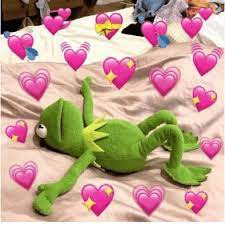

this is so sweet, thank you so much 😭🫶 this is such a huge compliment, i genuinely can't put into words how thankful i am <33
i really do try to create realistic experiences and emotions and pull from real life as much as i can and put together a world filled with detail and life and it always makes me beyond happy to get such kind messages like this 🥹
it's always such a cool thought to think that there are people all over the world who read my work 😭 it's so mind-blowing and i'm seriously so grateful that there really are people all over the world who read my fics
i can't thank you enough, this is so so sweet and made my day <33 i hope you have an amazing day/night, love!!
2 notes
·
View notes